#My uncle was very very Greek and he and my aunt (really my great-aunt and great-uncle) were such huge parts of my childhood.
Text
I wish to return to the Holy Baptistery of Saint Lydia of Philippi and dip my feet back into the cool waters there and listen to the trees and feel at peace again.
#I long for it.#It’s a horrendously deep longing.#I think about it so often?#How wonderful it was to be there?#The people we met purely by chance and spent the rest of the day with?#Following the journey depicted on the mosaic map and sitting by the stream and dipping our feet in and seeing the shrine.#It was so peaceful. I felt so? At ease.#The church was so beautiful as well and we were the only ones there ;;;#Getting to be with my family in Greece?#Getting to see my uncle? I fought so hard to go because I had a feeling it would be the last time#And it was. He died only a month after my visit.#It just. All of it felt special.#My uncle was very very Greek and he and my aunt (really my great-aunt and great-uncle) were such huge parts of my childhood.#That trip meant a lot to me I should have extended it#I want to go back ;;;#I want to go back to that site again.#I got to see the ancient city too ugh just. Ugh#text#chey.txt
1 note
·
View note
Text
My Invincible OC: Jason Blake.

So... my Viltrumite Swap AU, or Thragg n' Nolan switch roles and the butterfly effect causes massive changes, namely... just who is Jason Blake, otherwise known as Invincible?
Quick Facts.
Name: Jason Cassius Blake.
Birthday: 11/2.
Favorite color: Blue.
Named after the Greek Hero, Jason.
Backstory.
"So wait... you're an alien, which means I'M an alien?"
"Is that concerning to you, son?"
"No! It's cool!"- Jason's reaction to being told the Viltrumite story.
Jason was born a while after Thragg arrived to Earth and took the name Thomas Blake. His wife, Reyna, was already a heroine and impressed him with her strength. Reyna's looks prevailed over Thragg's in Jason's case, giving him golden eyes and golden hair.
The circumstances of Jason's birth actually made Thragg a little nervous, unsure if his wife's great strength would allow for their continued survival.
Little did Thragg know that his choice of wife combined with his already buffed Viltrumite strength would give Jason an edge over most enemies.
Throughout Jason's early days, Reyna and Thragg would swap taking care of him. Reyna saw it as bonding between father and son. She was right, of course...
Unfortunately, like the mainline universe, Life has a way of making tragedy happen to the main character no matter what. Turns out Reyna's mutation was rebelling against her body, with symptoms reminding Thragg of the Scourge Virus.
She made him swear to raise Jason to be kind, to fight for his home, because the baton is passed to him now.
Having also become a Guardian of the Globe, Jason grew up with the other guardians being a sort of fictive aunts and uncles. So he wasn't without love or care, just that Thragg tried his best to put walls between him and his son so he couldn't feel too much.
But Thragg had to become both Mother and Father to his son, and this is where he begins to change.
Personality.
So, Jason was raised by Thragg, which made him put aside a lot of his feelings to accomplish his goals. He also inherited his mother's hotbloodedness and some optimism from her too. It borders on being naive, which is what kills Thragg the most.
Jason's also kind of a fighter, having a scrappy style that's dirtier than most. He tends to get snappy with Rex and butts heads with Robot because he hates how logical he is.
He may be the smartest thing in the room, but Jason doesn't like the ideas Robot has. While they're right, he leans more towards his father's stories of conquerors and how they ended horribly.
He was encouraged to be part of the Teen Team as a way to get friends 'like him' that way he wouldn't feel alone... but he's oil and water with the guys.
Eventually, Rex and him get along.
But he's nice to Eve and Kate (and Amanda eventually.). Even with the Teen Team and going to school, Jason's still pretty lonely. His first power was super strength, then flight, then durability.
He's a very solemn kid sometimes. Even though the Guardians and his Dad are around, he feels like he's out of place. Unanchored, like any minute he's going to drift away.
Thragg did his best to raise his son as humanly as possible, but there's always this secretiveness between them. But he always seems to know if his son's in trouble.
Also imagine Thragg being involved in the parent's side of things when Jason was in Elementary School. Gossiping with the moms and chatting with the dads, because he sees it as coming across as more human.
Jason does okay in school, his father tried to push him to be in more programs and expand his horizons. Jason's pretty good at writing stories and really wanted to become a comic book writer so his dad's stories could somehow be kept up with.
In most encounters, Jason covers up his fear with confidence and is a little quippy. Until the absolute SLAUGHTER that is his father's 'education'.

Jason gets traumatized, Thragg flies away, after saying...
"When you get stronger, come find me, son."
Not even an apology, not even a sort of way to put a bandaid on a bullet wound, just another goal. (Thragg's breaking too, which is why he leaves. he loves his son, and would do anything to not give him the same fate as his brethren, but here it is.)
Needless to say after the beatdown, Jason's angry. His anger is turned on any villains he encounters. Cecil's trying to rein him in but how can you calm a kid who lost the only parent he has?
The fact that Immortal lashes out at him is even tougher. He has no one, but he still helps. Why?
Because it makes him happy to see people live their lives, to just be. So Cecil uses that for structure, gives the kid some kind of peace. All he has to do is work for him.
Surprisingly, Allen and Jason get along famously. Two sorta himbos who just wanna life their lives and well, make silly mistakes sometimes get along.
He's extremely self-sacrificial, and refuses to be selfish, it doesn't contribute to his own code of survival. Sends him clashing against Viltrumite Prince Mark.
The Suit.
Art made Jason a suit, and instead of being similar to his father's, Jason got a cool yellow and blue suit with a bright blue cape and boots, but no pads. So it's similar to Mark's Blue and Black suit. Jason doesn't have the goggles because they'd break anyway.
Later on, the cape goes away and becomes the kilt-like form that Thragg has. This comes in Post Season-2, when Jason's more alone than ever and it's more of a comfort move for him.
Romance?
I honestly have no idea. I like him and Eve, but at the same time it'd take a little longer than Mark and Eve in canon, mostly because our boy is a little more closed off than Mark is. So yeah, if I ever get a solid way of putting them together, I will. Same counts for anybody else.
If any of you have ideas, please feel free to share them!
7 notes
·
View notes
Note
weirdest new trend: western fans getting judgmental or self conscious about fuxi and nuwa being your typical brother-sister/husband-wife creator god duo like hello??
Oh wow I didn’t know about that! Very strange considering how popular Greek myth in the West and that is all wife-sister-niece-aunt/husband-brother-uncle-nephew relations that are best not thought about. Very inconsiderate at best to be judging another culture for having similar myths when that isn't uncommon in creation stories... the double standards are real.
I will admit, I was first introduced to Nvwa's story first and its original form when she was the lone creator. And I feel like a lot of media just use the myth that she is the only creator as well so that doesn't surprise me when people learn about her husband as he is rarely mentioned, and that Fuxi was only a later interpretation of her story. As much as I understand that the husband was added later because of trying to change how Nvwa's myth was told I wouldn't be too surprised if they just hear about her from recent JTTW media (not in the actual books let that be clear) or from Fengshen Yanyi or Nezha media and again she isn't depicted with a husband as he is near non-existant. It might be just my lack of seeing other media but I really don't think I've ever seen him in modern media. I know that might be just on me but at least that is my experience.
But it interesting video about the Nvwa's original myth that I higher recommend people see on how the two different myths 1. Her being a lone creation goddess and 2. When she is given her husband in later interpretations.
youtube
Also, he has a great piece of media free on Billi of Pangu and Nvwa making the humans!!
21 notes
·
View notes
Text
Random hilarious idea: jegulus my big fat greek wedding au. Except it's my big fat pure blood wedding. Let's pretend in this au the Black family is just snobby and a little crazy, but not like in the books, and James, he's an only child, BUT in this au in his family he has tons of cousins, aunts, uncles, and two sets of grandparents, and two great grandmothers that are still alive(and make lots of passive aggressive comments to James mother and how they only had one child really late in life). Also his family is an old desi family that goes back generations. So we have these two very old magic pure blood families that both have their own traditions and way of doing things clashing and driving each other crazy. They each wants this wedding to go a certain way. Meanwhile Jegulus just wants get married and be together. But they both care too much about their own families to just up and ditch and elope(especially for Regulus considering his parents guilt tripped him into not eloping like Sirius did). And this whole idea is hilarious and interesting and romantic. And just exploring the two different wizarding cultures (the Black's a French family and the Potter's a family from India)
Hilarious ideas for this au
Regulus crazy cousin Bellatrix
James family always trying to feed people.
Regulus parents especially his mother.
Andromeda being sympathic because the family was really snobby and crazy about her marrying Ted(Andromeda is still part of the family)
Sirius having eloped with Remus to avoid the Black family drama.
Sirius being the best man and also brother to the groom.
James family is nice, but make a lot of passive aggressive comments about his parents only having one child.
Narcissa and being the wedding planner while pregnant with Draco.
The marauders era gang is all here and is causing hilarious shenanigans.
Marlene and Dorcas getting together during the wedding basically just like how Monica and Chandler did during that episode of Friends.
James was the one to propose and it was cute.
Regulus can't swim and almost drowns during the wedding preparations(Don worry James saved him).
Sirius and Remus being so happy the eloped.
Regulus mother is warning onto its self.
Honeymoon Greece.
James and Sirius get stuck somewhere right before the wedding and starts and have to rush back.
Narcissa water breaks during all this. Regulus has to deliver the baby.
Regulus and James to get married in the end and it's beautiful.
@@silence-between-seconds @achillvs @sophsicle @drownedghostie
#my thoughts#jegulus#jegulus au#harry potter#my big fat greek wedding au#my big fat greek wedding#maraders era#marauders
20 notes
·
View notes
Note
Bonsoir ! 9.Shows on your watch list? & 10.Books on your reading list?
Bonsoir ! ^.^ Ça va ?
9. Shows on your watch list?
I need to catch up on The Great again and I just started the new season of WWDITS! I'd also love to go back and finish The Sopranos but I can't remember what episode I finished on fml :P I'm also looking forward to the new season of Futurama! :D I'm sure there are many other series that I wanna see/catch up on, but my mind's a blank atm! -_-"""
10. Books on your reading list?
Oh my god, everything, really! I have a book of Essays by Jean Cocteau that I want to read; more diaries by Cocteau too (all of his written works that I haven't read yet tbh!); Moi, la Clairon by Edwige Feuillère (I started it ages ago but college got too busy so I stopped and I've never gotten back to it); the complete works of Virginia Woolf (similarly, I had started To The Lighthouse and Orlando, but life got in the way lol)... I also want to finish The Idiot by Doestoevsky, and I'd love one day to be able to say I've read Crime and Punishment (also Dostoevsky) as well as Anna Karenina and War and Peace by Tolstoy. And finish reading all of Shakespeare's plays! I'd also love to read some Ibsen before seeing his work performed (especially Hedda Gabler). I also want to read more Sartre, Hesse, and Ancient Greek plays.
I have a very extensive list (poetry and biographies/autobiographies included), but all my books to read are in another house atm so I can't rattle off the list so easily! -_-"" Sorry about that :( I adopted a lot of books from my late uncle too (with my aunt's permission and relief) and he basically had a library room in their house, so my reading list is...very long now. I really wish I wasn't so mentally drained from teaching languages -- I'd love to be able to read as a hobby again... </3
Ask me something! <3
4 notes
·
View notes
Text
Propaganda for Prelim Poll 18
(Vote here)
Princess Gulltop (Reisen til julestjernen / Journey to the Christmas Star) :
"Gulltopp means gold top"
Kurogiri/Oburo Shirakumo (My Hero Academia) :
"Kurogiri's name translates to 'Black mist' and has been used as his name in an early fanslation I've seen. His design is also quite literally a man made out of black mist. Before he became who he is now he was a hero student named Oboro Shirakumo who had the ability to summon and control a cloud. Shirakumo, his family name, translates yo 'White cloud' which fitted his pale hair and ability before he died. After his death his body was harvested by the Bad Guys™ and corrupted into a villain, literally an ironic inverse"
Gebura/Kali a.k.a The Red Mist (Lobotomy Corporation) :
"GREAT SPLIT VERTICAL, GREAT SPLIT HORIZONTAL"
Blåmann (Blåmann) :
"Blåmann (lit. Blue man) is a depressing Norwegian song about a blind orphan boy who was taken in by his abusive aunt and uncle. His only friend in this world is his billygoat Blåmann who is there for him, working as his guide animal and protecting him against his aunt and uncle who are really upset about him being so close to the boy that they can't physically abuse him. After a sudden nap in the final verse however the boy is called for dinner, and he stumbles to the table as he can't find Blåmann anywhere. And that day... They serve goat for dinner...
Honestly I hate the song... It's an old children's song, probably has some lesson or something, but yeah... "
Rixidenteron "Red" Pastinas (Empire of Storms) :
"Nicknamed (and primarily referred to as) Red because of his naturally red eyes (canonically because his mother was an addict so it's essentially fantasy fetal alcohol syndrome). He's not popular and I haven't read these books in years but he's my boy. He's angsty and tortured and he hates rich people."
Hiyori Sou a.k.a Midori (Your Turn to Die) :
"You can technically choose his nickname, but he defaults to Midori, which is Japanese for "green". This is because, depending on your actions throughout the game, there may be another character also named Sou Hiyori with you. Very confusing, I know."
Red Plains Rider a.k.a Red (Thrilling Adventure Hour) :
"She's a cool cowboy lady who was raised by Martians (who in this universe are a stand in for indigenous Americans) and she kicks ass and also I love her. The pic is from the graphic novel adaptation btw "
Ianthe Tridentarius (The Locked Tomb) :
"Ianthe is ancient Greek for violet, as in both the colour and the flower. She has some purple colour theming, since the planetary system she's from has an assigned colour for each planet, except hers gets both purple and gold as a special treat. She also has purple eyes in the beginning but they change part way through. Personality-wise, she's terrible, just the worst. She's awful and the author has promised she is going to get worse in the last book. Unfortunately I find her compelling and I enjoy watching the other characters having to deal with her garbage behaviour. She's convinced she's the main character but everyone keeps interrupting her villain monologues."
Ash Crimson (King of Fighters) :
No propaganda yet
1 note
·
View note
Text
OKAY!!! I figured I would start this rant about my OC's with a little introduction to them considering I've never mentioned them in my life!!!!!!!!! There's 64 of them in total(that are actually plot relevant) but I'm not gonna do that today SO instead I'm gonna just introduce the main ghost hunting crew and a few extras I love dearly <3
They're under the cut ;0
First up!!! Our main character- Kosuke!!
Kosuke Vinci is Japanese, he's 19 years old and was adopted when he was 6 years old :D!! Hes 5"6 and enjoys music and art!! School is not his thing- nothing is, really, he's a temperamental, hot headed kid who swings first and asks questions later. He finds it really hard to socialise due to depersonalisation and deep-rooted trauma(he's working on it, apparently) and can't really keep friends- he does love people, though, theyre just very carefully picked people and he would(and probably has) murder for them. The fact that he's in college is a miracle, he was rejected from most schools despite being very well achieved academically- he was just too much for a problem starter for colleges to risk their reputations on him-
Next up is Jinn!! >:)
Jinn Ozan is, similar to Kosuke, very well achieved academically- he's Turkish, 16 years old and about to get a PHD in medicine. He's 5"11 and much bulkier than most kids his age, and has a hard time fitting in at college- everyone around him are older and give him crap for being so young, but it's genuinely not his fault- he was pushed into this- he's extremely extroverted and is always the life of the party, he doesn't let anything bother him and looks on the bright side of things- he's got DID- there are three people including Jinn in the system. Jinn is almost too optimistic, and is insanely interested in ghosts and magic :D
Then there's Diego Gomez and Desi Gomez!!!
Diego and Desi Gomez are siblings, Diego is 21 and Desi is 15, and Mexican!! Diego is studying business and is well on his way to making his own company. Desi is a bit less organised than their older brother and is less interactive than Diego. Diego is quick on his feet, calm and collected and protective over his friends and family- he's also the only one with a licence. Desi is quiet, introverted and scares easy- they compliment each other well. Diego is unfortunately only 5"0 tall, while Desi absolutely towers over him at 6"2. Desi was adopted at 8 years old, when their parents, Diegos aunt and uncle, were killed in a car crash that left Desi's face scarred. Desi is intimidating to most people around them, so they keep to themselves- Diego is working on getting them out of their shell :D
Now we have Lapis >:D
Lapis Mikos is 20 years old, 5"8 and half Greek, half Scottish!!! They're apart of a huge family with 5 siblings and is studying photography!! Lapis is as tough as nails and easy to be around, she's the lead singer in their band at college and is one of the first people in the ghost hunter group that Kosuke meets!! She's a great cook and always has snacks on hand but can be forgetful and they have ZERO sense of direction. Theyre Jinn's roommate at college by force(she stuck Jinn in- he lives alone off campus!!!!) And they're the second best option for driving(she can fly a plane but not drive a car ;0) they often work out at the gym close by the college and can lift Desi up effortlessly ✨️
Next up(almost done I promise!!) Is Ellie!!!
Ellie Williams(El is preferred) is 19 and Latin-American!!!! They lived with their grandparents on a farm until recently and moved into the city for college and to reconnect with their dad. They're studying computer science and is nearly always on their phone, laptop- a screen of some description- they're an only child and refused a roommate when assigned a dorm :O their room is a designated hang-out spot!!!! They're pretty scrawny, only 5"5 and wouldn't last long in a fight- though they talk shit often. They like to provoke Kosuke a lot because he gets frustrated really easily, though Lapis usually ends up between them so Kosuke doesn't blow a fuse at El- they're the one who approached the group about ghost hunting in the first place, having already seen/looked into the entire thing in their free time. El is a quiet, stoic person- they're apathetic at times but will stand up for their friends if needs be- they're mature ✨️
Last but definitely not least!!!! Tess >:>
Tess Visser is 22 and half Polish, half Dutch!!!! She's actually doesn't go to school with the rest of the group- she's a junior detective at the local police station!! She helps out a lot with their investigations because she's really curious herself- she's been through military school and is working with the chief that saved her life when she was only small, so she can get away with a few things if needs be. While she doesn't believe in ghosts, she does admit it's fun to run around town with people her own age- the officers at the police station are three times her age. She's 5"9 and built, her and Lapis work out together often!!!! Her and her dad don't have the best relationship, after his arrest and her mother's death when she was small- she never really forgave him for that- so she helps people whenever she can >:>!! She's pretty cool and likes to poke Kosukes buttons with El :D
1 note
·
View note
Text
Anonymous asked: I have always appreciated your thoughtful views on the defence of the British monarchy, and as a university historian it’s reassuring to see someone using history to make invalubale insights to a controversial institution. I wonder what are your own thoughts on the passing of Prince Philip and what his legacy might be? Was he a gaffe prone racist and a liability to the Queen?
I know you kindly got in touch and identified yourself when you felt I was ignoring your question. I’m glad we cleared that up via DM. The truth is as I said and I’m saying here is that I had to let some time pass before I felt I could reasonably answer this question. Simply because - as you know as someone who teaches history at university - distance is good to make a sober appraisal rather than knee jerk in the moment judgements.
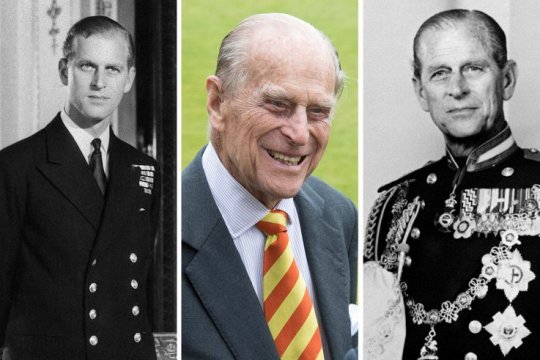
Contrary to what some might think I’m not really a fan girl when it comes to the royal family. I don’t religiously follow their every movement or utterance especially as I live in Paris and therefore I don’t really care about tabloid tittle tattle. I only get to hear of anything to do with the royal family when I speak to my parents or my great aunts and uncles for whom the subject is closer to their heart because of the services my family has rendered over past generations to the monarchy and the older (and dying) tight knit social circles they travel in.
Like Walter Bagehot, I’m more interested in the monarchy as an institution and its constitutional place within the historical, social, and political fabric of Britain and its continued delicate stabilising importance to that effect. It was Walter Bagehot, the great constitutional scholar and editor the Economist magazine, who said, “The mystic reverence, the religious allegiance, which are essential to a true monarchy, are imaginative sentiments that no legislature can manufacture in any people.” In his view, a politically-inactive monarchy served the best interests of the United Kingdom; by abstaining from direct rule, the monarch levitated above the political fray with dignity, and remained a respected personage to whom all subjects could look to as a guiding light.
Even as a staunch monarchist I freely confess that there has always been this odd nature of the relationship between hereditary monarchy and a society increasingly ambivalent about the institution. To paraphrase Bagehot again, there has been too much ‘daylight’ shone onto the ‘magic’ of the monarchy because we are obsessed with personalities as celebrities.
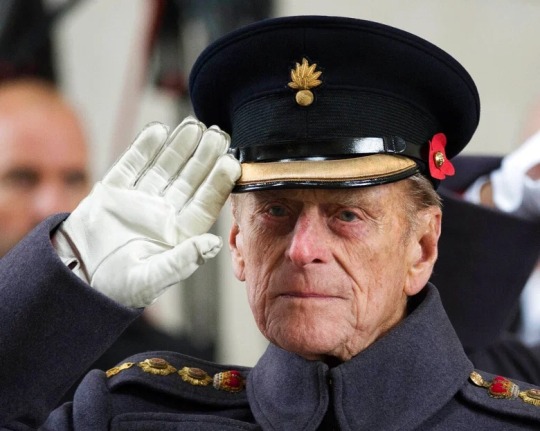
Having said that I did feel saddened by the passing of Prince Philip, the Duke of Edinburgh. After the Queen, he was my favourite royal. Anne, Princess Royal, would come next because she is very much like her father in temperament, humour, and character, so unlike her other brothers.
I have met the late Prince Philip when I was serving in the army in a few regimental meet-and-greet situations - which as you may know is pretty normal given that members of the royal family serve as honorary colonel-in-chiefs (patrons in effect) of all the British army regiments and corps.I also saw him at one or two social events such the annual charitable Royal Caledonian Ball (he’s an expert scottish reeler) and the Guards Polo Club where my older brothers played.
I’ll will freely confess that he was the one royal I could come close to identify with because his personal biography resonated with me a great deal.
Let’s be honest, the core Windsor family members, born to privilege, are conditioned and raised to be dull. Perhaps that’s a a tad harsh. I would prefer the term ‘anonymously self-effacing’, just another way of saying ‘for God’s sake don’t draw attention to yourself by saying or doing anything even mildly scandalous or political lest it invites public opprobrium and scrutiny’. The Queen magnificently succeeds in this but the others from Charles down just haven’t (with the exception of Princess Anne).
However, many people forget this obvious fact that it’s the incoming husbands and wives who marry into the Windsor family who are relied upon to bring colour and even liven things up a little. And long before Kate Middleton, Meghan Markle (very briefly), or Lady Diana Spencer, were the stars of ‘The Firm’- a phrase first coined by King George VI, Queen Elizabeth II's father who ruled from 1936 to 1952, who was thought to have wryly said, "British royals are 'not a family, we're a firm,” - it was Prince Philip who really livened things up and made the greater impact on the monarchy than any of them in the long term.
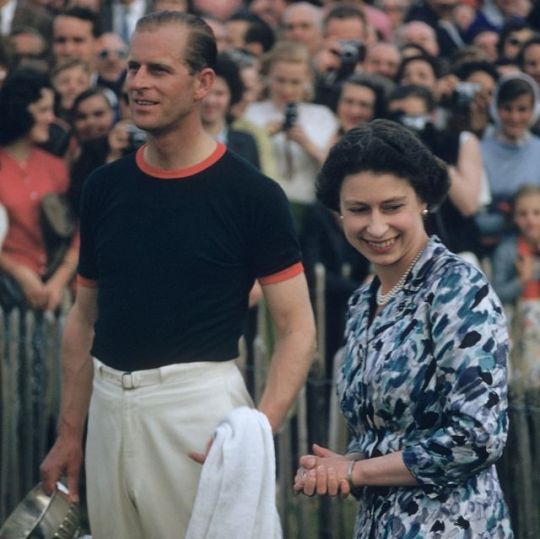
Prince Philip’s passing belied the truth of a far more complex individual: a destitute and penniless refugee Greek-Danish prince with a heart breaking backstory that could have been penned by any 19th Century novelist, and also eagle eyed reformer who tried to drag the royal family into the 20th century. At the core of the man - lost scion of a lost European royal dynasty, a courageous war veteran, and Queen’s consort - were values in which he attempted to transform and yet maintain much older inherited traditions and attitudes. Due to his great longevity, Philip’s life came to span a period of social change that is almost unprecedented, and almost no one in history viewed such a transformation from the front row.
Prince Philip would seem to represent in an acute form the best of the values of that era, which in many ways jar with today’s. He had fought with great courage in the war as a dashing young naval officer; he was regularly rude to foreigners, which was obviously a bonus to all Brits. He liked to ride and sail and shoot things. He was unsentimental almost to a comic degree, which felt reassuring at a time when a new-found emotional incontinence made many feel uncomfortable. Outrageous to some but endearing to others, he was the sort of man you’d want to go for a pint with, perhaps the ultimate compliment that an Englishman can pay to another Englishman. This has its own delicious irony as he wasn’t really an Englishman.
There are 4 takeways I would suggest in my appraisal of Prince Philip that stand out for me. So let me go through each one.
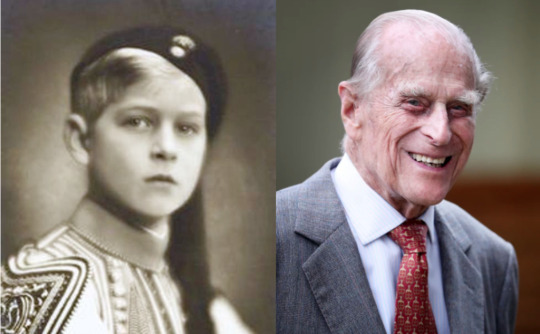
1. Prince Philip’s Internationalism
It may seem odd for me to say that Prince Philip wasn’t English but he wasn’t an Englishman in any real sense. He was a wretch of the world - stateless, homeless, and penniless. That the Prince of Nowhere became the British Monarchy’s figurehead was more than fitting for a great age of migration and transition in which the Royal Family survived and even flourished. That he was able to transform himself into the quintessential Englishman is testimony not just to his personal determination but also to the powerful cultural pull of Britishness.
He was born on a kitchen table in Corfu in June 1921. A year later in 1922, Philip, as the the great-great-grandson of Queen Victoria and nephew of Constantine I of Greece, was forced to flee with his family after the abdication of Constantine. He grew up outside Paris speaking French; ethnically he was mostly German although he considered himself Danish, his family originating from the Schleswig border region. He was in effect, despite his demeanour of Royal Navy officer briskness, a citizen of nowhere in an age of movement. From a very young age he was a stateless person, nationally homeless. Indeed, Philip was an outsider in a way that even Meghan Markle could never be; at his wedding in 1947, his three surviving sisters and two brothers-in-law were not permitted to attend because they were literally Britain’s enemies, having fought for the Germans. A third brother-in-law had even been in the SS, working directly for Himmler, but had been killed in the conflict.
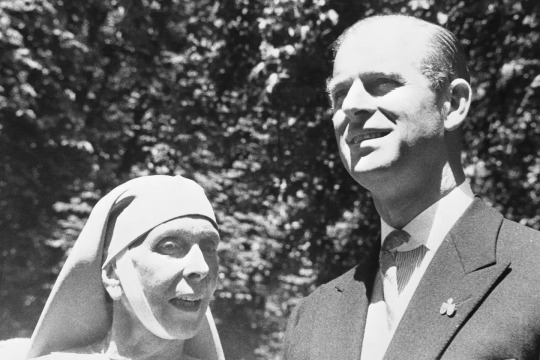
Even his religion was slightly exotic. He was Greek Orthodox until he converted to Anglicanism on marrying Elizabeth - what with his wife due to become supreme head of the Church and everything - but his ties with eastern Christianity remained. His great-aunts Princess Elisabeth of Hesse and by Rhine and Tsarina Alexandra are both martyrs of the Russian Orthodox Church, having been murdered by the Bolsheviks; Philip’s mother went on to become an Orthodox nun and a “Righteous Among the Nations” for saving a Jewish family during the Nazi occupation of Greece, spending much of her time in squalid poverty.
His parents were part of the largely German extended aristocracy who ruled almost all of Europe before it all came crashing down in 1918. When he died, aged 99, it marked a near-century in which all the great ideological struggles had been and gone; he had been born before the Soviet Union but outlived the Cold War, the War on Terror and - almost - Covid-19.
The world that Philip was born into was a far more violent and dangerous place than ours. In the year he was born, Irish rebels were still fighting Black and Tans; over the course of 12 months the Spanish and Japanese prime ministers were assassinated, there was a coup in Portugal and race riots in the United States. Germany was rocked by violence from the far-Left and far-Right, while in Italy a brutal new political movement, the Fascists, secured 30 seats in parliament, led by a trashy journalist called Benito Mussolini.
The worst violence, however, took place in Greece and Turkey. Following the defeat of the Ottoman Empire, what remained of Turkey was marked for permanent enfeeblement by the Allies. But much to everyone’s surprise the country’s force were roused by the brilliant officer Mustafa Kemal, who led the Turks to victory. Constantinople was lost to Christendom for good and thousands of years of Hellenic culture was put to the flames in Smyrna.
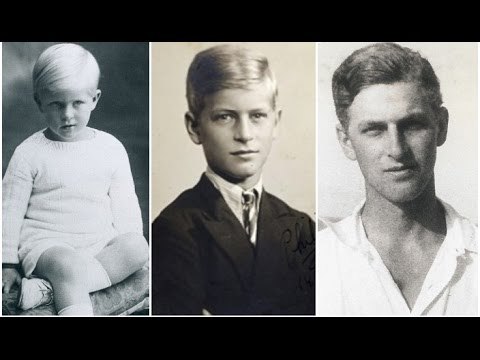
The Greek royal family, north German imports shipped in during the 19th century, bore much of the popular anger for this disaster. King Constantine fled to Italy, and his brother Andrew was arrested and only escaped execution through the intervention of his relative Britain’s George V. Andrew’s wife Alice, their four daughters and infant son Philip fled to France, completely impoverished but with the one possession that ensures that aristocrats are never truly poor: connections.
Philip had a traumatic childhood. He was forged by the turmoil of his first decade and then moulded by his schooling. His early years were spent wandering, as his place of birth ejected him, his family disintegrated and he moved from country to country, none of them ever his own. When he was just a year old, he and his family were scooped up by a British destroyer from his home on the Greek island of Corfu after his father had been condemned to death. They were deposited in Italy. One of Philip's first international journeys was spent crawling around on the floor of the train from an Italian port city, "the grubby child on the desolate train pulling out of the Brindisi night," as his older sister Sophia later described it.
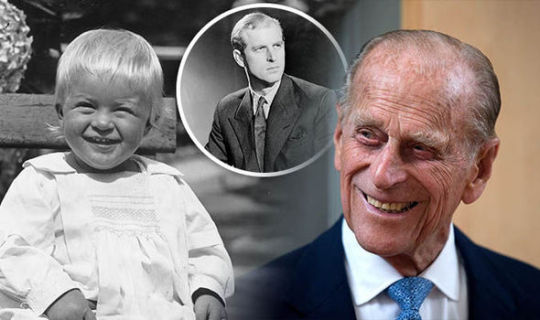
In Paris, he lived in a house borrowed from a relative; but it was not destined to become a home. In just one year, while he was at boarding school in Britain, the mental health of his mother, Princess Alice, deteriorated and she went into an asylum; his father, Prince Andrew, went off to Monte Carlo to live with his mistress. "I don't think anybody thinks I had a father," he once said. Andrew would die during the war. Philip went to Monte Carlo to pick up his father's possessions after the Germans had been driven from France; there was almost nothing left, just a couple of clothes brushes and some cuff-links.
Philip’s four sisters were all much older, and were soon all married to German aristocrats (the youngest would soon die in an aeroplane crash, along with her husband and children). His sisters became ever more embroiled in the German regime. In Scotland going to Gordonstoun boarding school, Philip went the opposite direction, becoming ever more British. Following the death of his sister Cecilie in a plane crash in 1937, the gulf widened. As the clouds of conflict gathered, the family simply disintegrated. With a flash of the flinty stoicism that many would later interpret, with no little justification, as self-reliance to the point of dispassion, the prince explained: “It’s simply what happened. The family broke up… I just had to get on with it. You do. One does.”
In the space of 10 years he had gone from a prince of Greece to a wandering, homeless, and virtually penniless boy with no-one to care for him. He got through it by making a joke of everything, and by being practical.
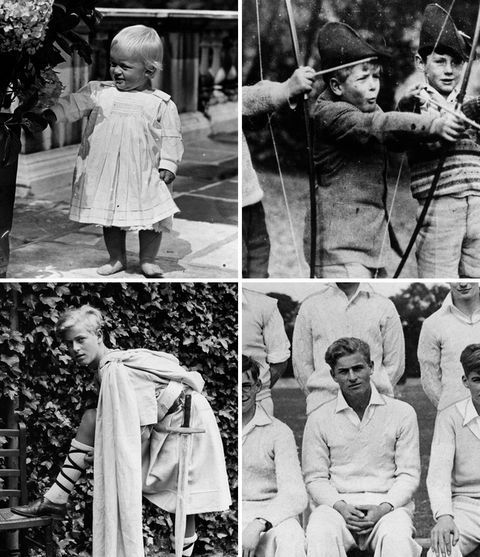
By the time he went to Gordonstoun, a private boarding school on the north coast of Scotland, Philip was tough, independent and able to fend for himself; he'd had to be. Gordonstoun would channel those traits into the school's distinct philosophy of community service, teamwork, responsibility and respect for the individual. And it sparked one of the great passions of Philip's life - his love of the sea. It was Gordonstoun that nurtured that love through the maturation of his character.
Philip adored the school as much as his son Charles would despise it. Not just because the stress it put on physical as well as mental excellence - he was a great sportsman. But because of its ethos, laid down by its founder Kurt Hahn, a Jewish exile from Nazi Germany.
Hahn first met Philip as a boy in Nazi Germany. Through a connection via one of his sister’s husbands, Philip, the poor, lonely boy was first sent off to a new school - in Nazi Germany. Which was as fun as can be imagined. Schloss Salem had been co-founded by stern educator called Kurt Hahn, a tough, discipline-obsessed conservative nationalist who saw civilisation in inexorable decline. But by this stage Hahn, persecuted for being Jewish in Nazi Germany, had fled to Britain, and Philip did not spend long at the school either, where pressure from the authorities was already making things difficult for the teachers. Philip laughed at the Nazis at first, because their salute was the same gesture the boys at his previous school had to make when they wanted to go to the toilet, but within a year he was back in England, a refugee once again.
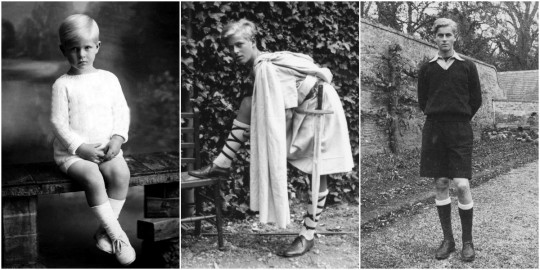
Philip happily attended Hahn’s new school, Gordonstoun, which the strict disciplinarian had set up in the Scottish Highlands. Inspired by Ancient Sparta, the boys (and then later girls) had to run around barefoot and endure cold showers, even in winter, the whole aim of which was to drive away the inevitable civilisational decay Hahn saw all around him. To 21st century ears it sounds like hell on earth, yet Philip enjoyed it, illustrating just what a totally alien world he came from.
That ethos became a significant, perhaps the significant, part of the way that Philip believed life should be lived. It shines through the speeches he gave later in his life. "The essence of freedom," he would say in Ghana in 1958, "is discipline and self-control." The comforts of the post-war era, he told the British Schools Exploring Society a year earlier, may be important "but it is much more important that the human spirit should not be stifled by easy living". And two years before that, he spoke to the boys of Ipswich School of the moral as well as material imperatives of life, with the "importance of the individual" as the "guiding principle of our society".
It was at Gordonstoun one of the great contradictions of Philip's fascinating life was born. The importance of the individual was what in Kurt Hahn's eyes differentiated Britain and liberal democracies from the kind of totalitarian dictatorship that he had fled. Philip put that centrality of the individual, and individual agency - the ability we have as humans to make our own moral and ethical decisions - at the heart of his philosophy.
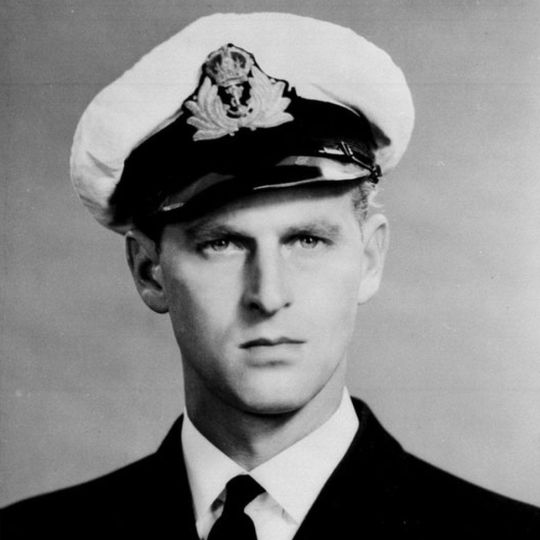
At Dartmouth Naval College in 1939, the two great passions of his life would collide. He had learned to sail at Gordonstoun; he would learn to lead at Dartmouth. And his driving desire to achieve, and to win, would shine through. Despite entering the college far later than most other cadets, he would graduate top of his class in 1940. In further training at Portsmouth, he gained the top grade in four out of five sections of the exam. He became one of the youngest first lieutenants in the Royal Navy.
The navy ran deep in his family. His maternal grandfather had been the First Sea Lord, the commander of the Royal Navy; his uncle, "Dickie" Mountbatten, had command of a destroyer while Philip was in training. In war, he showed not only bravery but guile. It was his natural milieu. "Prince Philip", wrote Gordonstoun headmaster Kurt Hahn admiringly, "will make his mark in any profession where he will have to prove himself in a trial of strength".
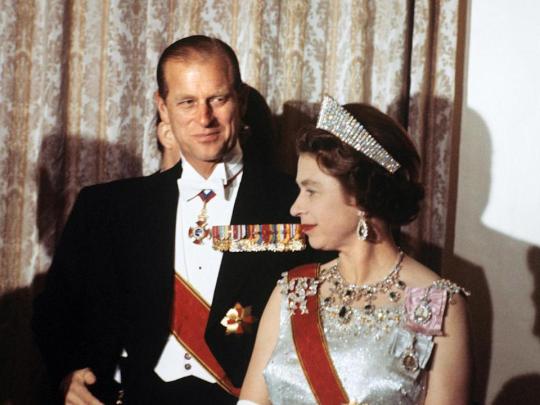
2. Prince Philip and the modernisation of the monarchy
In his own words, the process of defining what it meant to be a royal consort was one of “trial and error.” Speaking with BBC One’s Fiona Bruce in 2011, Philip explained, “There was no precedent. If I asked somebody, 'What do you expect me to do?' they all looked blank. They had no bloody idea, nobody had much idea.” So he forged for himself a role as a moderniser of the monarchy.
He could not have had much idea back in 1939. Back then in Dartmouth in 1939, as war became ever more certain, the navy was his destiny. He had fallen in love with the sea itself. "It is an extraordinary master or mistress," he would say later, "it has such extraordinary moods." But a rival to the sea would come.
When King George VI toured Dartmouth Naval College, accompanied by Philip's uncle, he brought with him his daughter, Princess Elizabeth. Philip was asked to look after her. He showed off to her, vaulting the nets of the tennis court in the grounds of the college. He was confident, outgoing, strikingly handsome, of royal blood if without a throne. She was beautiful, a little sheltered, a little serious, and very smitten by Philip.
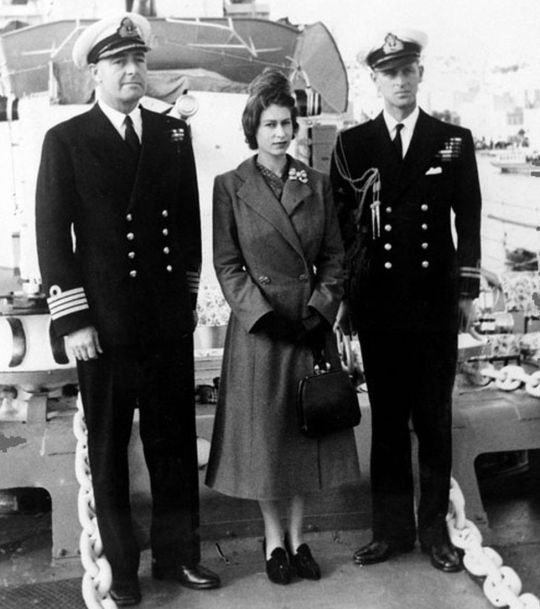
Did he know then that this was a collision of two great passions? That he could not have the sea and the beautiful young woman? For a time after their wedding in 1948, he did have both. As young newlyweds in Malta, he had what he so prized - command of a ship - and they had two idyllic years together. But the illness and then early death of King George VI brought it all to an end.
He knew what it meant, the moment he was told. Up in a lodge in Kenya, touring Africa, with Princess Elizabeth in place of the King, Philip was told first of the monarch's death in February 1952. He looked, said his equerry Mike Parker, "as if a ton of bricks had fallen on him". For some time he sat, slumped in a chair, a newspaper covering his head and chest. His princess had become the Queen. His world had changed irrevocably.
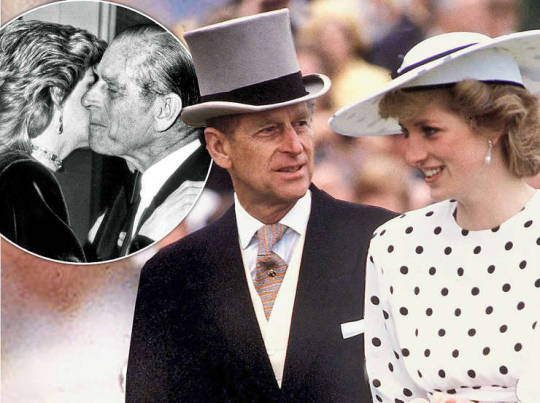
While the late Princess Diana was later to famously claim that there were “three people” in her marriage - herself, Prince Charles and Camilla - there were at least 55 million in Philip and Elizabeth’s. As Elizabeth dedicated her life to her people at Westminster Abbey at the Coronation on June 2, 1953, it sparked something of an existential crisis in Philip. Many people even after his death have never really understood this pivotal moment in Philip’s life. All his dreams of being a naval officer and a life at sea as well as being the primary provider and partner in his marriage were now sacrificed on the altar of duty and love.
With his career was now over, and he was now destined to become the spare part. Philip, very reasonably, asked that his future children and indeed his family be known by his name, Mountbatten. In effect he was asking to change the royal family’s name from the House of Windsor to the House of Mountbatten. But when Prime Minister Winston Churchill got wind of it as well as the more politically agile courtiers behind the Queen, a prolonged battle of wits ensued, and it was one Philip ultimately lost. It was only in 1957 that he accepted the title of “Prince.”
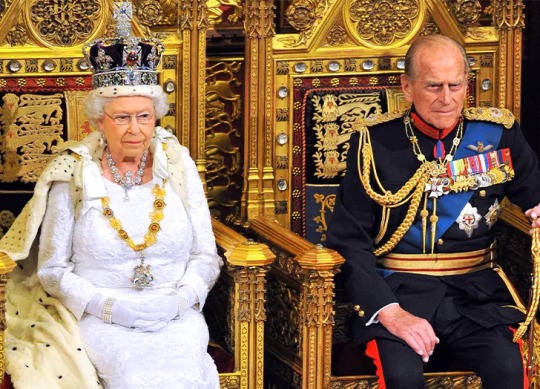
Even though he had almost lost everything dear to him and his role now undefined, he didn’t throw himself a pity party. He just got on with it. Philip tried to forge his own distinct role as second fiddle to the woman who had come to represent Great Britain. He designated himself the First Officer of the Good Ship Windsor. He set about dusting off some of the cobwebs off the throne and letting some daylight unto the workings of the monarchy by advocating reasonable amount of modernisation of the monarchy.
He had ideas about modernising the royal family that might be called “improving optics” today. But in his heart of hearts he didn’t want the monarchy to become a stuffy museum piece. He envisaged a less stuffy and more popular monarchy, relevant to the lives of ordinary people. Progress was always going to be incremental as he had sturdy opposition from the old guard who wanted to keep everything as it was, but nevertheless his stubborn energy resulted in significant changes.
When a commission chaired by Prince Philip proposed broadcasting the 1953 investiture ceremony that formally named Elizabeth II as queen on live television, Prime Minister Winston Churchill reacted with outright horror, declaring, “It would be unfitting that the whole ceremony should be presented as if it were a theatrical performance.” Though the queen had initially voiced similar concerns, she eventually came around to the idea, allowing the broadcast of all but one segment of the coronation. Ultimately, according to the BBC, more than 20 million people tuned in to the televised ceremony - a credit to the foresight of Philip.
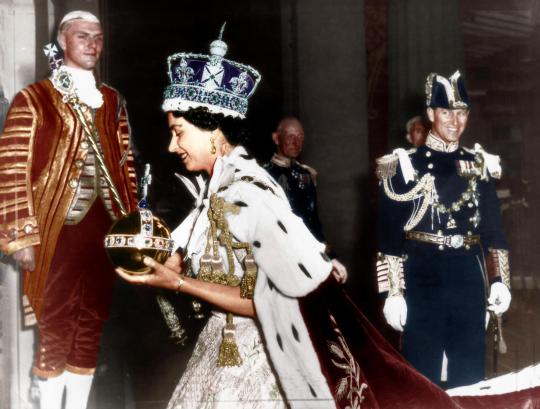
Elizabeth’s coronation marked a watershed moment for a monarchy that has, historically, been very hands off, old-fashioned and slightly invisible. Over the following years, the royals continued to embrace television as a way of connecting with the British people: In 1957, the queen delivered her annual Christmas address during a live broadcast. Again, this was Philip’s doing when he cajoled the Queen to televise her message live. He even helped her in how to use the teleprompter to get over her nerves and be herself on screen.
Four years later, in 1961, Philip became the first family member to sit for a television interview. It is hard for us to imagine now but back then it was huge. For many it was a significant step in modernising the monarchy.
Though not everything went to plan. Toward the end of the decade, the Windsors even invited cameras into their home. A 1969 BBC fly-on-the-wall documentary, instigated by Philip to show life behind the scenes, turned into an unmitigated disaster: “The Windsors” revealed the royals to be a fairly normal, if very rich, British upper-class family who liked barbecues, ice cream, watching television and bickering. The mystery of royalty took a hit below the waterline from their own torpedo, a self-inflicted wound from which they took a long time to recover. Shown once, the documentary was never aired again. But it had an irreversible effect, and not just by revealing the royals to be ordinary. By allowing the cameras in, Philip opened the lid to the prying eyes of the paparazzi who could legitimately argue that since the Royals themselves had sanctioned exposure, anything went. From then on, minor members of the House of Windsor were picked off by the press, like helpless tethered animals on a hunting safari.
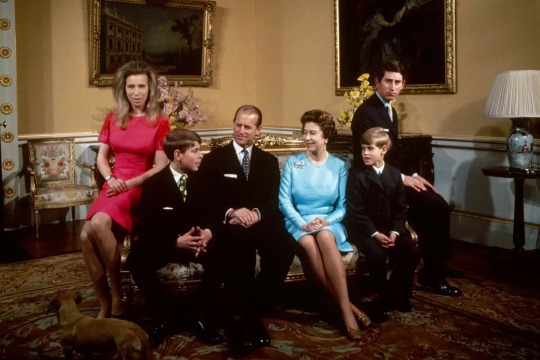
Prince Philip also took steps to reorganise and renovate the royal estates in Sandringham and Balmoral such as intercoms, modern dish washers, generally sought to make the royal household and the monarchy less stuffy, not to have so much formality everywhere.
Philip helped modernised the monarchy in other ways to acknowledge that the monarchy could be responsive to changes in society. It was Prince Philip - much to the chagrin of the haughty Princess Margaret and other stuffy old courtiers - who persuaded the Queen to host informal lunches and garden parties designed to engage a broader swath of the British public. Conversely, Prince Philip heartily encouraged the Queen (she was all for it apparently but was still finding her feet as a new monarch) to end the traditional practice of presenting debutantes from aristocratic backgrounds at court in 1952. For Philip and others it felt antiquated and out of touch with society. I know in speaking to my grandmother and others in her generation the decision was received with disbelief at how this foreign penniless upstart could come and stomp on the dreams of mothers left to clutch their pearls at the prospect there would be no shop window for their daughter to attract a suitable gentleman for marriage. One of my great aunts was over the moon happy that she never would have to go through what she saw as a very silly ceremony because she preferred her muddy wellies to high heels.
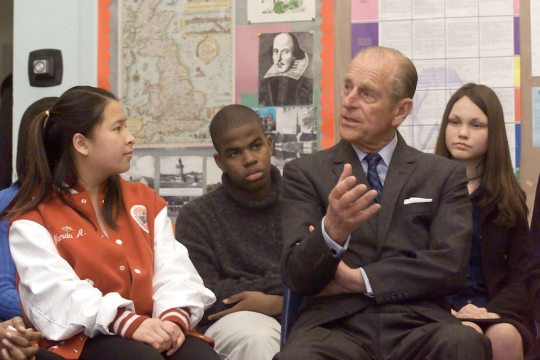
A former senior member of the royal household, who spent several years working as one of Prince Philip’s aides, and an old family friend, once told us around a family dinner table that the Duke of Edinburgh was undoubtedly given a sense of permanence by his marriage into the Royal Family that was missing from earlier years. But the royal aide would hastily add that Prince Philip, of course, would never see it that way.
Prince Philip’s attitude was to never brood on things or seek excuses. And he did indeed get on with the job in his own way - there should be no doubt that when it came to building and strengthening the Royal Family it was a partnership of equals with the Queen. Indeed contrary to Netflix’s hugely popular series ‘The Crown’ and its depiction of the royal marriage with Philip’s resentment at playing second fiddle, the prince recognised that his “first duty was to serve the Queen in the best way I could,” as he told ITV in 2011. Though this role was somewhat ill-suited to his dynamic, driven, and outspoken temperament, Philip performed it with utter devotion.
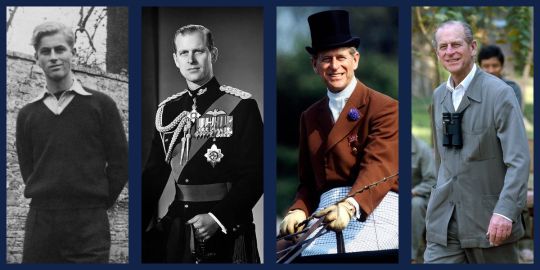
3. Prince Philip’s legacy
One could argue rightly that modernising the monarchy was his lasting legacy achievement. But he also tried to modernise a spent and exhausted Britain as it emerged from a ruinous war. When peace came, and with it eventual economic recovery, Philip would throw himself into the construction of a better Britain, urging the country to adopt scientific methods, embracing the ideas of industrial design, planning, education and training. A decade before Harold Wilson talked of the "white heat of the technological revolution", Philip was urging modernity on the nation in speeches and interviews. He was on top of his reading of the latest scientific breakthroughs and well read in break out innovations.
This interest in modernisation was only matched by his love for nature. As the country and the world became richer and consumed ever more, Philip warned of the impact on the environment, well before it was even vaguely fashionable. As president of the World Wildlife Fund (WWF) in the UK for more than 20 years from 1961, he was one of the first high-profile advocates of the cause of conservation and biological diversity at a time when it was considered the preserve of an eccentric few.
For a generation of school children in Britain and the Commonwealth though, his most lasting legacy and achievement will be the Duke of Edinburgh Awards (DofE). He set up the Duke of Edinburgh award, a scheme aimed at getting young people out into nature in search of adventure or be of service to their communities. It was a scheme that could match the legacy of Baden Powell’s scouts movement.
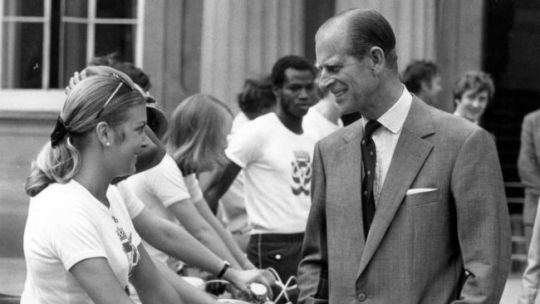
When Prince Philip first outlined his idea of a scheme to harness the values of his education at Gordonstoun by bringing character-building outdoor pursuits to the many rather than the fee-paying few, he received short shrift from the government of the day. The then minister of education, Sir David Eccles responded to the Duke’s proposal by saying: “I hear you’re trying to invent something like the Hitler Youth.” Undeterred he pushed on until it came to fruition.
I’m so glad that he did. I remember how proud I was for getting my DofE Awards while I was at boarding school. With the support of great mentors I managed to achieve my goals: collecting second-hand English books for a literacy programme for orphaned street children in Delhi, India with a close Indian school friend and her family; and completing a 350 mile hike following St. Olav’s Pilgrimmage Trail from Selånger, on the east coast of Sweden, and ending at Nidaros Cathedral in Trondheim, on the west coast of Norway.
It continues to be an enduring legacy. Since its launch in 1956, the Duke of Edinburgh awards have been bestowed upon some 2.5 million youngsters in Britain and some eight million worldwide. For a man who once referred to himself as a “Greek princeling of no consequence”, his pioneering tutelage of these two organisations (alongside some 778 other organisations of which he was either president or a patron) would be sufficient legacy for most.
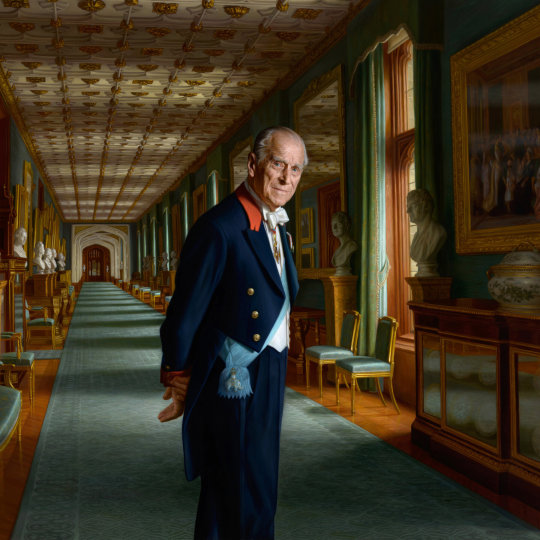
4. Prince Philip’s character
It may surprise some but what I liked most about Prince Philip was the very thing that helped him achieve so much and leave a lasting legacy: his character.
It is unhelpful to the caricature of Prince Philip as an unwavering but pugnacious consort whose chief talent was a dizzying facility in off-colour one-liners that he was widely read and probably the cleverest member of his family.
His private library at Windsor consists of 11,000 tomes, among them 200 volumes of poetry. He was a fan of Jung, TS Eliot, Shakespeare and the cookery writer Elizabeth David. As well as a lifelong fascination with science, technology and sport, he spoke fairly fluent French, painted and wrote a well received book on birds. It’s maddening to think how many underestimated his genuine intellect and how cultured he was behind the crusty exterior.
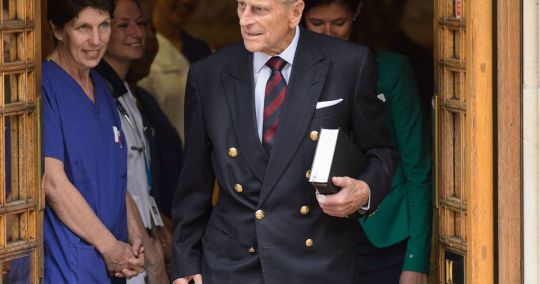
He didn’t have an entourage to fawn around him. He was the first to own a computer at Buckingham Palace. He answered his own phone and wrote and responded to his own correspondence. By force of character he fought the old guard courtiers at every turn to modernise the monarchy against their stubborn resistance.
Prince Philip was never given to self-analysis or reflection on the past. Various television interviewers tried without success to coerce him in to commenting on his legacy.But once when his guard was down he asked on the occasion of his 90th birthday what he was more proud of, he replied with characteristic bluntness: “I couldn’t care less. Who cares what I think about it, I mean it’s ridiculous.”
All of which neatly raises the profound aversion to fuss and the proclivity for tetchiness often expressed in withering put-downs that, for better or worse, will be the reflex memory for many of the Duke of Edinburgh. If character is a two edged sword so what of his gaffes?
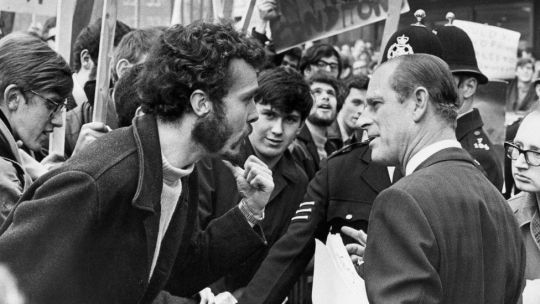
There is no doubt his cult status partly owed to his so-called legendary gaffes, of which there are enough to fill a book (indeed there is a book). But he was no racist. None of the Commonwealth people or foreign heads of state ever said this about him. Only leftist republicans with too much Twitter time on their hands screamed such a ridiculous accusation. They’re just overly sensitive snowflakes and being devoid of any humour they’re easily triggered.
There was the time that Philip accepted a gift from a local in Kenya, telling her she was a kind woman, and then adding: “You are a woman, aren’t you?” Or the occasion he remarked “You managed not to get eaten, then?” to a student trekking in Papua New Guinea. Then there was his World Wildlife Fund speech in 1986, when he said: “If it has got four legs and it is not a chair, if it has got two wings and it flies but is not an aeroplane, and if it swims and it is not a submarine, the Cantonese will eat it.” Well, he wasn’t wrong.
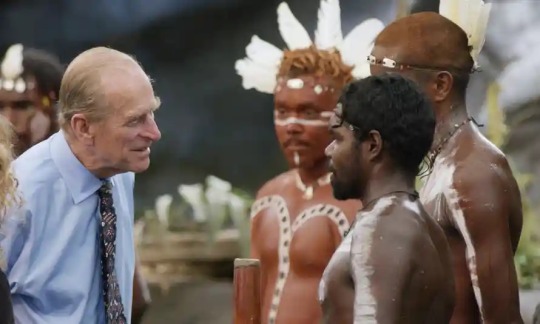
Philip quickly developed a reputation for what he once defined, to the General Dental Council, as “dentopedology – the science of opening your mouth and putting your foot in it”. Clearly he could laugh at himself as he often did as an ice breaker to put others at ease.
His remarking to the president of Nigeria, who was wearing national dress, “You look like you’re ready for bed”, or advising British students in China not to stay too long or they would end up with “slitty eyes”, is probably best written off as ill-judged humour. Telling a photographer to “just take the fucking picture” or declaring “this thing open, whatever it is”, were expressions of exasperation or weariness with which anyone might sympathise.
Above all, he was also capable of genuine if earthy wit, saying of his horse-loving daughter Princess Anne: “If it doesn’t fart or eat hay she isn’t interested.” Many people might have thought it but few dared say it. If Prince Philip’s famous gaffes provoked as much amusement as anger, it was precisely because they seem to give voice to the bewilderment and pent-up frustrations with which many people viewed the ever-changing modern world.
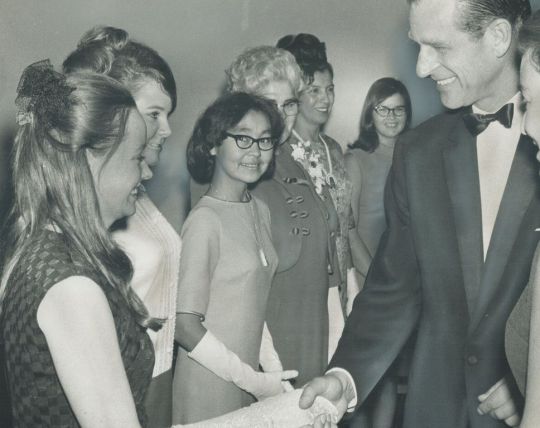
A former royal protection officer recounts how while on night duty guarding a visiting Queen and consort, he engaged in conversation with colleagues on a passing patrol. It was 2am and the officer had understood the royal couple to be staying elsewhere in the building until a window above his head was abruptly slammed open and an irate Prince Philip stuck his head out of the window to shout: “Would you fuck off!” Without another word, he then shut the window.
The Duke at least recognised from an early age that he was possessed of an abruptness that could all too easily cross the line from the refreshingly salty to crass effrontery.
One of his most perceptive biographers, Philip Eade, recounted how at the age of 21 the prince wrote a letter to a relation whose son had recently been killed in combat. He wrote: “I know you will never think much of me. I am rude and unmannerly and I say things out of turn which I realise afterwards must have hurt someone. Then I am filled with remorse and I try to put matters right.”
In the case of the royal protection officer, the Duke turned up in the room used by the police officers when off duty and said: “Terribly sorry about last night, wasn’t quite feeling myself.”
Aides have also ventured to explain away some of their employer’s more outlandish remarks - from asking Cayman islanders “You are descended from pirates aren’t you?” to enquiring of a female fashion writer if she was wearing mink knickers - as the price of his instinctive desire to prick the pomposity of his presence with a quip to put others at ease.
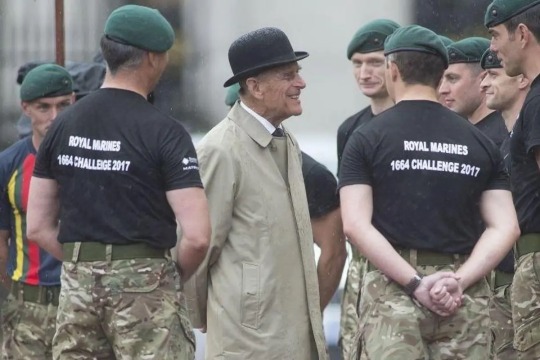
Indeed many people forget that his ‘gaffes’ were more typical of the clubbish humour of the British officer class – which of course would be less appreciated, sometimes even offensive, to other ears. It’s why he could relate so well to veterans who enjoyed his bonhomie company immensely.
But behind the irascibility, some have argued there also lay a darker nature, unpleasantly distilled in his flinty attitude to his eldest son. One anecdote tells of how, in the aftermath of the murder of the Duke’s uncle and surrogate father, Lord Mountbatten, Philip lectured his son, who was also extremely fond of his “honorary grandfather”, that he was not to succumb to self-pity. Charles left the room in tears and when his father was asked why he had spoken to his son with so little compassion, the Duke replied: “Because if there’s any crying to be done I want it to happen within this house, in front of his family, not in public. He must be toughened up, right now.”
But here I would say that Prince Philip’s intentions were almost always sincere and in no way cruel. He has always tried to protect his family - even from their own worst selves or from those outside the family ‘firm’ who may not have their best interest at heart.
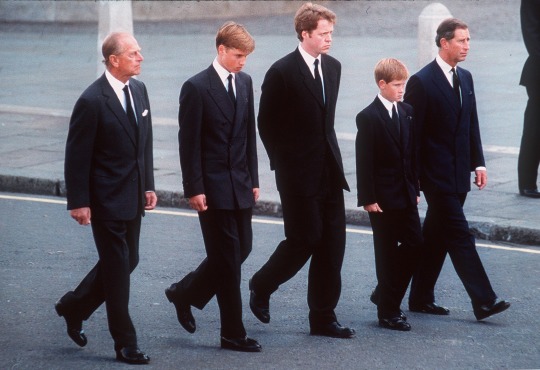
In 1937, a 16-year-old Prince Philip had walked behind his elder sister Cecile’s coffin after she was killed in a plane crash while heavily pregnant. The remains of newly-born infant found in the wreckage suggested the aircraft had perished as the pilot sought to make an emergency landing in fog as the mother entered childbirth. It was an excruciating taste of tragedy which would one day manifest itself in a very princely form of kindness that was deep down that defined Philip’s character.
When about 60 years later Prime Minister Tony Blair’s spin doctors in Downing Street tried to strong arm the Queen and the royal household over the the arrangements for the late Prince Diana’s funeral, it was Philip who stepped in front to protect his family. The Prime Minister and his media savvy spin doctors wanted the two young princes, William and Harry, to walk behind the coffin.
The infamous exchange was on the phone during a conference call between London and Balmoral, and the emotional Philip was reportedly backed by the Queen. The call was witnessed by Anji Hunter, who worked for Mr Blair. She said how surprised she was to hear Prince Philip’s emotion. ‘It’s about the boys,” he cried, “They’ve lost their mother”. Hunter thought to herself, “My God, there’s a bit of suffering going on up there”.’
Sky TV political commentator Adam Boulton (Anji Hunter’s husband) would write in his book Tony’s Ten Years: ‘The Queen relished the moment when Philip bellowed over the speakerphone from Balmoral, “Fuck off. We are talking about two boys who have just lost their mother”. Boulton goes on to say that Philip: ‘…was trying to remind everyone that human feelings were involved. No 10 were trying to help the Royals present things in the best way, but may have seemed insensitive.’
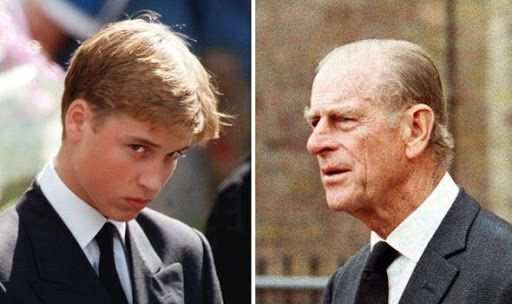
In the end the politicians almost didn’t get their way. Prince Philip stepped in to counsel his grandson, Prince William, after he had expressed a reluctance to follow his mother’s coffin after her death in Paris. Philip told the grieving child: “If you don’t walk, I think you’ll regret it later. If I walk, will you walk with me?”
It’s no wonder he was sought as a counsellor by other senior royals and especially close to his grandchildren, for whom he was a firm favourite. His relationship with Harry was said to have become strained, however, following the younger Prince’s decision to reject his royal inheritance for a life away from the public eye in America with his new American wife, Meghan Markle. For Prince Philip I am quite sure it went against all the elder Prince had lived his life by - self-sacrifice for the greater cause of royalty.
This is the key to Philip’s character and in understanding the man. The ingrained habits of a lifetime of duty and service in one form or another were never far away.
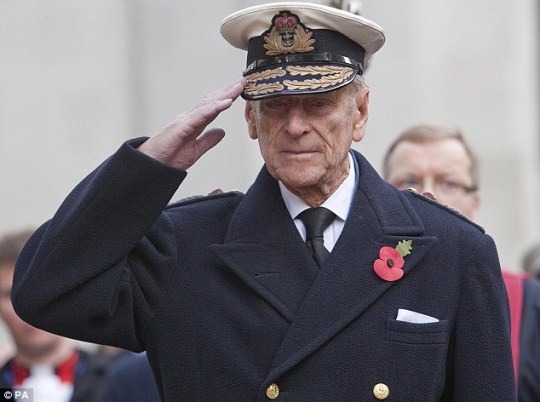
In conclusion then....
After more time passes I am sure historians will make a richer reassessment of Prince Philip’s life and legacy. Because Prince Philip was an extraordinary man who lived an extraordinary life; a life intimately connected with the sweeping changes of our turbulent 20th Century, a life of fascinating contrast and contradiction, of service and some degree of solitude. A complex, clever, eternally restless man that not even the suffocating protocols of royalty and tradition could bind him.
Although he fully accepted the limitations of public royal service, he did not see this as any reason for passive self-abnegation, but actively, if ironically, identified with his potentially undignified role. It is this bold and humorous embrace of fated restriction which many now find irksome: one is no longer supposed to mix public performance with private self-expression in quite this manner.
Yet such a mix is authentically Socratic: the proof that the doing of one’s duty can also be the way of self-fulfilment. The Duke’s sacrifice of career to romance and ceremonial office is all the more impressive for his not hiding some annoyance. The combination of his restless temperament and his deeply felt devotion to duty found fruitful expression; for instance, in the work of Saint George’s House Windsor - a centre and retreat that he created with Revd. Robin Woods - in exploring religious faith, philosophy, and contemporary issues.
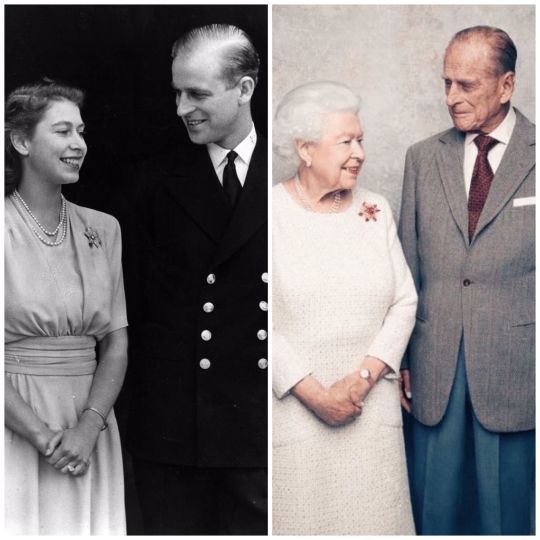
Above all he developed a way to be male that was both traditional and modern. He served one woman with chivalric devotion as his main task in life while fulfilling his public engagements in a bold and active spirit. He eventually embraced the opportunity to read and contemplate more. And yet, he remained loyal to the imperatives of his mentor Kurt Hahn in seeking to combine imagination with action and religious devotion with practical involvement.
Prince Philip took more pride in the roles he had accidentally inherited than in the personal gifts which he was never able fully to develop. He put companionship before self-realisation and acceptance of a sacred symbolic destiny before the mere influencing of events. In all these respects he implicitly rebuked our prevailing meritocracy which over-values officially accredited attainment, and our prevailing narcissism which valorises the assertion of discrete identities.
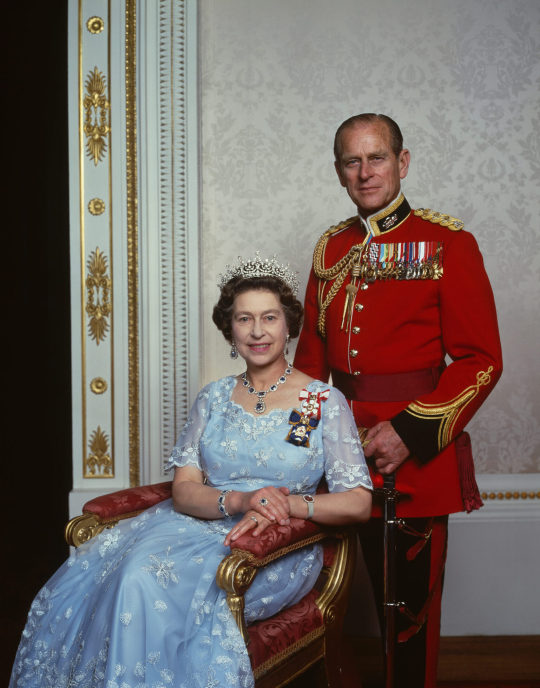
Prince Philip was Britain’s longest-serving consort. He was steadfast, duty driven, and a necessary adjunct to the continuity and stability of the Queen and the monarchy. Of all the institutions that have lost the faith of the British public in this period - the Church, Parliament, the media, the police - the Monarchy itself has surprisingly done better than most at surviving, curiously well-adapted to a period of societal change and moral anarchy. The House of Hanover and later Saxe-Coburg and Gotha (changed to Windsor), since their arrival in this country in 1714, have been noted above all for their ability to adapt. And just as they survived the Victorian age by transforming themselves into the bourgeoise, domestic ideal, so they have survived the new Elizabethan era (Harry-Meghan saga is just a passing blip like the Edward-Wallis Simpson saga of the 1930s).
There was once a time when the Royal’s German blood was a punchline for crude and xenophobic satirists. Now it is the royals who are deeply British while the country itself is increasingly cosmopolitan and globalised. British society has seen a greater demographic change than the preceding four or five thousand years combined, the second Elizabethan age has been characterised more than anything by a transformational movement of people. Prince Philip, the Greek-born, Danish-German persecuted and destitute wanderer who came to become one of the Greatest Britons of the past century, perhaps epitomised that era better than anyone else. And he got through it by making a joke of everything, and by being practical.
I hope I don’t exaggerate when I say that in our troubled times over identity, and our place and purpose in the world, we need to heed his selfless example more than ever.
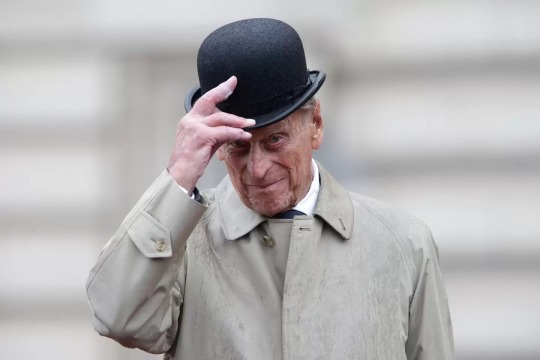
As Heraclitus wisely said, Ήθος ανθρώπω δαίμων (Character is destiny.)
RIP Prince Philip. You were my prince. God damn you, I miss you already.
Thanks for your question.
#question#ask#prince philip#duke of edinburgh#queen elizabeth II#the queen of spades#monarchy#britain#british#royalty#politics#history#culture#europe#crown#icon#great briton#society
284 notes
·
View notes
Text
Aelius Anatole Radošević De Silva
Anatole has changed a bit as a character since i was around the first time, so he’s getting re introduced. His open to make friends.
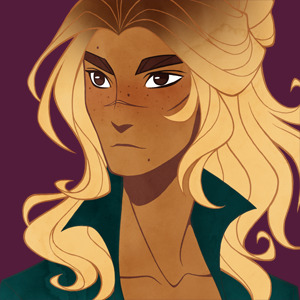
art by @elizastarkart
Name: Aelius Anatole Radoševic De Silva. He has two surnames because his mother is latina. He is a mixed Latine-Slav, with family that is all latine, vesuvian, and slavic. People he’s friend’s with call him Anatole (russian/greek pronunciation, he doesn’t acknowledge the French one). Only people he has a strictly professional relationship with, and his uncle call him Aelius.
‘Aelius’ means sun, while ‘Anatole’ means sunrise. He’s fully aware of this, he chose his name himself.
His nicknames are:
‘Nana’ is the most common nickname, and the one most people use.
His mother calls him Lilito, Nana, Nanito, Toly, Tolito, Tortolito.
His father calls him Lily or Lilu.
Toly, Tolytoly or Tolito are nicknames used by his maternal grandmother, his aunt, and his Vesuvian family.
He will not mind if you want to call him Toly, but you cannot call him Lily/Lilu if you’re not his father.
Asra came up with Nanatole, which he doesn’t like but lets Asra call him anyway. Asra also came up with Nana Banana and that is absolutely forbidden.
Family: on his father’s side both the Radošević, who are slavic (yugoslavic, specifically), and the Cassano, a prominent Vesuvian family who has had a hold of the Consulship for years.
On his mother side, the De Silva.
His father’s name is Vladislav, but everyone calls him Vlad, he’s an alchemist, a polymath, and works in what is most similar to biochemical engineering. He has one bother, named Valeriy, who you, however, might now as Valerius. Vlad’s biggest personality trait is being head over heels in love with his wife, and adoring his son more than he thought it was humanly possible to care about someone.
His mother’s name is Louisa De Silva (if you want to add her mother’s surname, it’s Lascal). The L-o-u spelling was a registry mistake she never changed. She moved half across the world while her native country suffer a military-civilian dictatorship to study Medicine. She swore never to go back as long as vestiges of said dictatorship remained in the country. She has two sisters: Paris, who lives in Vesuvia, and Alma, who remained with her parents out of her own choosing. Her medical experience include having been a volunteer war doctor. She didn’t change her surname when she got married.
The Radošević (pronounced Radozheveech) and the Cassano have been entangled families by friendship for generations upon generations, with some marriages between them. Notoriously: Vlad and Val’s father married a Cassano, Matilda, and his bother Mircea, Anatole’s great uncle, also married a Cassano: Florentino. Mircea’s brother and Matilda Cassano died when Vlad and Val were children still, so him and Florentino brought them up.
The Radošević are an overall eccentric family (think the european Addams family), whom are noted for: one, their self-sufficiency/self-preservation, which comes out in a very ‘eccentric people of the world unite’ manner. They appreciate people with character. Two, their leanings towards trades/professions, they do not conceive not doing anything (work hard to play hard). The Cassano, while sharing the quirk, they add the zest for life. It’s like they grabbed the Radošević and told them “you have forgotten how to live and we will remind you how.” Both of them are ridden with racially ambiguous bastard you cannot kill in any way that matters. They simply refuse to. Someone (either the courtiers or Lucio) compared them to roaches, they took it as a compliment.
This will tell you a lot about Anatole’s character.
On a last note, Anatole’s an only child. He has a good relationship with his parents, albeit marked by a sense of distance, solely because he was privately tutored from age 15 and on, which required him to travel a fair share. He was an argumentative teenager, but always cherished whenever he could see his parents. The older he gets, the closer they all become.
Favourite Food: Cake
Favourite drink: Coffee, in general.
Favourite Flower: Iris
Birthday: Nov 1st
Age: 29 (I calculate his age as if he had been born in 1991)
Zodiac:
Sun: Scorpio
Moon: Virgo
Rising: Libra
Mercury & Mars: Scorpio
Venus: Virgo
Patron arcana: Strength & Ace of Swords
Strength
Upright: inner strength, bravery, compassion, focus, Reversed: self doubt, weakness, insecurity
Ace of Swords
Upright: breakthrough, clarity, sharp mind, Reversed: confusion, brutality, chaos
MBTI Type: INTJ-A
Gender: Transmasculine, but Nonbinary. Uses He/Him pronouns only
Orientation: Identifies as NBLM.
LIs: Julian, Muriel, @ilyamatic‘s Andrico, @thelazaretmakesmesad‘s Vishal.
“The sun-like strategist with a solution for everything, and a whole lot of hope in the future.”
More details under the cut!
Physical appearance:
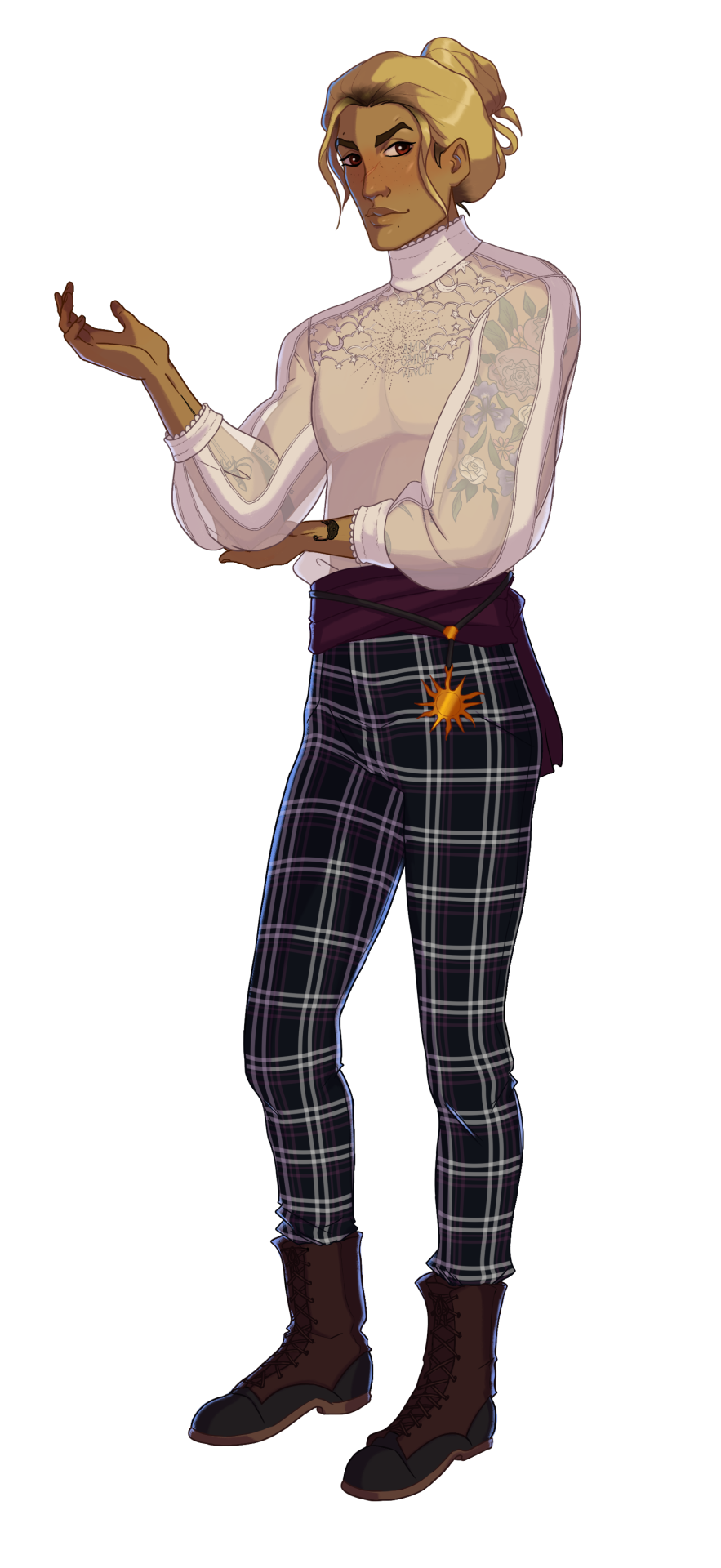
art by @lesbianarcana
5′4. As you can see in the sprite down below, while he’s slim but with muscle, out of doing a moderate to high level of physical activity. The man has a nice waist and inherited his mother’s hips, which he’s very proud of. He likes his legs and his butt the most about himself
Dark brown eyes, long eyelashes. His hair is naturally black, but he dyes it blond.
Has a mole over his right eyebrow, on the left side of the bridge of his nose, and on his left jaw. He has freckles.
An horizontal scar on his nose, which he got by getting hit with a wooden scaffold square in the face. His nose wasn’t broken out of sheer dumb luck. He has a smaller cut on his cheekbone, which was done by a fencing sabre which lacked the proper tip protection/button. It was done onto him by someone else.
The nose scar is how he met Julian before the plague, as he was the doctor which cured his face.
He has several tattoos:
Right arm: A rapier on his inner forearm. Over his elbow he has a black work band, and over it the words ‘THE SUN IS MY UNDOING’ in all caps, circling his arm.
Left arm: a snake wrapped around his forearm, near to the wrist. The Odyssey quote ‘let’s have a toast to the incompetence of our enemies’ under the inner crook of his elbow, and a floral half sleeve.
Chest and Torso: AMOR OMNIA VINCIT over where his heart is supposed to be. He has laurel leaves on the base of his waist.
Legs: ‘o serpent heart hid with a flowering face‘ in his upper, inner thigh, like really up his left inner thigh. A floral anklet on his right ankle.
Languages Spoken: Too many. He speaks nine languages.
Magic Specialities: His magic is connected to both light and languages (it is a play on words with ‘logos’) so he is both adept in photokinesis — he is able to create and manipulate sources of light — and language related magic — which includes incantation and language manipulation. He learns languages as a faster rate than most people, and while he cannot speak or literally understand a language unless he learns it, his magic allows him to intuitively grasp the meaning of words that are being spoken to him.
This capacity also makes him very good at recognising hidden intentions in people. This is not an ability that he broadcasts having, and when he later succeeds Valerius as the Consul, it is something which aids his diplomatic work but he keeps private.
His words tend to carry more weight sometimes because of his magic, something which he can’t always control — it depends on many factors — so he tries to choose his words carefully and with consideration.
His familiar is a Raccoon, named Antu.
Occupation: While he did study magic and is in touch with his magic, he studied politics, diplomacy and international relations. By trade, and out of will to help people, he is a political analyst and, later in life, a Statesman.
Personality/Trivia:
Willpower or Stubbornness? Depends how you look at it. Passionate, generally devoted, hopeful, independent and sometimes defiant. He is a people-oriented introvert. Competitive, but not aggressively so.
Smarter than he gives himself credit for. Overall charming, even debonair.
Curious by nature, hates having his decisions taken for him.
He is proper, sometimes even distinguished, but he is feral. A firm believer in being kind and compassionate with people, until you cross him one too many times, then nothing will make him taint his vindictive wrath.
Is he humble? For the most part. His humbleness comes from knowing his own limits and knowing he’s not infallible. He does have, however, a good deal of pride in himself and trust in what he can do, and he doesn’t like being underestimated.
He’s not particularly loud, though when the chatterbox is on, then it is on, specially if he’s nervous. He is often never still.
He’s known he has ADHD since he was seventeen.
Likes dancing.
He fences, almost every Radošević fences/sword fights, and he will let you know at the slightest chance. Which can be either him simply being hyper-fixated in fencing, him flirting, or him letting you know that if the occasion rises, he’s armed.
Friend shaped, lover shaped if you’re daring enough.
He wrinkles his nose when he doesn’t like something.
Speaking of which: he doesn’t like abuse of power, the Court, injustice, supremacists of any kind, unkind, hurtful and selfish people in general; he doesn’t like red meat (he says it tastes like metal or dirt), narrow minded people, incompetence, specially when displayed by people in positions of power, and purposeful apathy.
A mastermind archetype, but he draws his power from connection. He does not conceive a life not lived with others.
A bit of a bastard, he enjoys a good laugh.
He plays the piano and the harp, he sings, he cannot draw, he’s a lightweight when it comes to alcohol (which doesn’t really stop him), he likes the opera because he likes watching other people’s drama without being dragged into it, and his favourite season is winter. Also likes playing chess, reading, coffee, flowers, a well tailored outfit, learning, languages, the sea, mysteries, winter, a well laid argument, collecting quills, music, winning, knowing he loves and is loved in return.
When he was 7 he bribed his dad for more dessert, and he ate so much he vomited. His sweet tooth hasn’t gone anywhere, it is alive and well.
Perceptive little bastard, will knife cat you for the sake of it. He has a way more present sense of humour than what he comes across.
Would call himself a ‘trans masculine Mary Poppins’.
He is closest to his parents, his uncle, my other ocs Leonore, Medea and Sabine, his cousins Amparo Cassano and Milenko Radošević, Natiqa, Asra, Portia and Nadia.
If he liked women, he would be paired with Nadia. The possibility both terrifies and fascinates me.
@ilyamatic, @viviae, @gaybirdwrites, @arcanaprentiss @apprenticeofcups
93 notes
·
View notes
Text
A Dumb Rant About A Webtoon
Okay so I’m actually super into reading webcomics (I read them on both Webtoon and Tapas), and although this has nothing to do with my blog (I AM considering making a side blog for webcomic content/reviews tho) I sort of feel like ranting about one that I saw. I’m sorry, but if you like Athena Complex this is probably going to piss you off. Admittedly, I couldn’t get far into the comic without being upset about this so I stopped reading a few chapters in, so that may affect my opinion here. This is mainly my opinion though, and if you disagree with me it’s fine.
So I did mention in my Fire Emblem kelpie beast unit post my opinion on mythological adaptation. Essentially, I believe that when you adapt any sort of mythological being into your story you need to keep these two things in mind:
The recognizable features/symbols/abilities: by this I mean what physical features is this being known to have, what are their physical/magical abilities, what objects are they most associated with, etc. You don’t need to have every single thing that is mentioned in the source material, just a decent combination of them that can allow the reader to easily connect the adaptation to the source material.
This factor mainly applies to individual characters as opposed to a full species or classification of creatures (I have read a decent number of mythological adaptations and have seen a mythical species depicted as evil in one adaptation and benevolent or neutral in another and enjoyed both, it all depends on if it makes sense in the context). What are the character’s main personal views, goals, and motivations? By this I mean how do they think and what are their views on the world around them, and what is the context surrounding that? Essentially, what can their main personalities and motivations be boiled down to and why?
After those two factors, I think that you can then go buck wild with any other characterization as long as it isn’t contradictory and makes sense in your story.
Now that I have set that down here’s my deal with Athena Complex. Athena Complex is a Webtoon based on Greek mythology that follows Athena, the Greek goddess of wisdom and strategy. She falls in love with Poseidon, the god of the sea, and is rejected by him. Fueled by vengeance and a desire to win his heart she takes the form of a high school boy in order to take revenge on his reincarnation. Basically, this entire Webtoon is practically a public execution of a large part of what makes Athena, well, Athena.
First off, I will give credit to Athena Complex for at least getting the symbolism correct, Athena is a goddess of wisdom and war and when in the form of a goddess her design reflects that with her armor, among other things such as her association with owls, so the first aspect that I mentioned is fine.
Additionally there is the fact that they also did heavily tap into the prideful aspect of Athena’s nature. Essentially in the source material Athena is a VERY prideful goddess and will take any opportunity to prove her worth if someone attempt to upstage her, and gets very angry when she fails or is insulted in the process (ie the story of Arachne, the story behind the double flute). This aspect could also be seen slightly in Athena Complex’s Athena’s behavior, which I can also give them credit for.
But that’s where a lot of the similarities end. Tbh a large majority of these issues surround the second aspect, the basics of the figure’s personality and motivations.
First, Athena’s stance on romance. Original Athena...literally wanted nothing to do with any sort of romantic relationship. Seriously it’s one of her main things one of her epithets is literally “Parenthos”, which means virgin. No lovers, no sex, no marriage, no intentionally created children (I say intentionally bc she and Hepheastus accidentally created a child when his snot got onto a torn piece of her cloak, but that’s a different weird story), nothing. She solely focused on the expansion of knowledge and learning. She had no time for any sort of relationship. Making Athena in Athena Complex heavily motivated by an unrequited romantic attraction literally rips one of her main core values to shreds.
And this in my opinion one of the worst offenses, MAKING THE SUBJECT OF THAT ROMANTIC ATTRACTION POSEIDON. Literally one MAJOR thing for the original Athena and Poseidon is that they HATE each other. (Also Athena is literally Poseidon’s niece, but tbh that’s a less heinous crime bc Greek mythology was weird about that shit, multiple gods married their siblings/cousins/uncles/aunts/nieces/nephews/etc., it’s weird. Also in Athena Complex Poseidon acted the main person raising Athena, which is ALSO really fucking weird and concerning, anyway back to why they hate each other).
The Contest for Athens: Basically before the Greek city of Athens was called Athens the people were looking for a patron deity, and both Athena and Poseidon tried to lay their claim. In order to determine who the city would go to, they decided to have a contest of who could give the city the best gift. Poseidon gave the city some horses (for transportation and farmwork) and a small spring in the middle of the city (note: the water in the spring was salt water and therefore undrinkable). Athena gave them olive trees (for food, making oil, wood, etc.). The peoplr decided that Athena’s gift was better and thus named the city “Athens” after her, leaving Poseidon incredibly salty.
The Medusa Incident (TW: possible rape/non-con): So Poseidon was having a nice little affair with a mortal woman named Medusa (you notice how this name is familiar, right? that’s important). It’s a little iffy on whether or not this affair was fully consensual on Medusa’s end due to the sort of victim blame-y aspects to this story, hence the trigger warning. So Poseidon his having his fun and decides to find a nice little place they can go to do the nasty. Where does he think would be a great idea? One of Athena’s temples of course! You know, a literal place of worship dedicated to his rival who is known to dislike involvement in romantic/sexual relationships? Nothing could go wrong at all! They of course get caught, and Athena, being pissed, decides to curse Medusa with snakes for hair and the ability to turn people into stone just by looking at them (see why the name was familiar?) For good measure she also curses Medusa’s two sisters with the snake hair. The sisters are then dubbed the Gorgons and then go live in isolation on a island until they are killed by Perseus (a hero that Athena was helping).
So this Webtoon completely ignores the context behind this hatred and decides to make it into an enemies to lovers story based on unrequited feelings (the feelings of a person for their childhood caretaker too...still weird). I guess they wanted to do enemies to lovers and such based on a rivalry dynamic, but in doing so they erased most of the actual substance behind that rivalry by making it romantic and destroying the characterization of one of the main characters.
I can understand taking creative liberties, but before you do so you NEED to have a full understanding of the characters that you are adapting. If a mythological character is known for a certain practice (refraining from romance) or for having an extreme distaste for another figure (Athena hating Poseidon), INCLUDE IT. You NEED to have all of the bare bones basics before you start taking liberties.
For example, the original Athena:
Goddess of wisdom and strategy
Association with owls, olives, carries a shield known as Aegis
Highly values learning and knowledge
Prideful to a fault
Virgin goddess with no interest in romantic or sexual relationships
Extreme hatred for Poseidon as a result of repeated negative encounters
Those are the bare bones basics, after that you can do what you want.
Honestly I don’t think that this Webtoon is necessarily BAD, but it is VERY annoying when you have the context behind these characters (hence my frustration and inability to make it past 10 chapters). In my opinion, if the author wanted to write this storyline, they should have made their own OCs as opposed to butchering a pre-existing figure’s characterization.
(Also I’m so sorry I know that this isn’t relevant to my argument BUT THE POSEIDON REINCARNATION LOOKS SO BORING HE LOOKS LIKE A BACKGROUND CHARACTER WHERE IS THE FLAVOR????)
#athena complex#athena complex webtoon#webtoon#rant#again this is just my opinion#i don’t expect anyone to fully agree with me#tw mention of rape/noncon
10 notes
·
View notes
Text
Okay, I know, I know, it's already old news, everybody and their uncle in the costuming community has already talked it over, but anyhoo, I made notes when I crawled my way through effing Bridgerton and I will be damned if I don't vomit them onto this site. I have 32 pages of this shit, I'm not gonna throw that away.
I'm also typing this on my phone because I'm stuck on a trainride that's just doubled in length because this is the 2021 Northern German snow storm. What, there's snowflakes on the rails? We cannot possibly keep up our schedule, say goodbye to 90% of the connections.
Okay, on to Bridgerton, Episode 1
We're in Britain (oh, London, okay), allegedly 1813. I see people who are clearly meant to be asympatico, but is this size incusivity I spot there? Daring! Gasp! Me li...
Oh wait, no. The character is promptly shamed for her figure (which is mostly caused by the horrible cut of her dress. Every size can look great in Regency garb, but never mind, we need to make the "fat one" look bad!).
Also, no shifts under the stays. Why. There was obviously enough budget, don't tell me you couldn't afford a few strappy tops - it's not like the rest is historically accurate, so it would have sufficed to send some poor underpaid intern to H&M and get some. Nvm, that wouldn't be sexay.
Wait, is the garishly dressed (always a sign of a character of bad character in a costume drama) woman Delphine from Selfridge? Does she always have to play bitches? That's not nice, and just because she has a recognisable face, which by modern (read: americanised) standards is not favourable enough. Ugh. But I like the actress, so I'll let it slide (for now).
Lol, buttocks.
Not sure about the girls' dresses. Also, the Queen is a WOC, cool!
Oh no, one of the Featherington sisters faints! But that's okay because the Featheringtons are just comic relief and foil anyway.
I get weird incest vibes from the Bridgertons.
So the court is clearly 18th century and the show is set in the 1810s. I've by now seen several explanations for this decision, I still think it robs the Queen of reproductions of her actual historical gowns which were heavily inspired by the 18th century but so. Magnificently. Weird. It would have been so neat, and more of a "hey, I'm kinda out of touch with things" vibe, but hey, I'm not the one getting paid for making those taffeta gowns here (her hair is glorious, tho).
I'm very into the intro.
That Regency gossip girl is a real b, not unlike the Dowager Countess of Downton (unpopular opinion, I think she's pretty overrated, yes, I like Maggie Smith).
Again, no shifts.
Where do I know the "pragmatic" Bridgerton sister from? Ah, it's The Paradise. And Jonathan Strange. (Wait, she's my age. And she's supposed to be a teenager. Man, do I love a good Dawson casting. I like the actress, though, she has a face ™!).
Aaaah. We get it. She's the spirited one. She also doesn't care about dresses because she's not like other girls™. I really like her voice (but she still doesn't sound like a teenager).
The heck is up with Lady F's dress and that of her friend? Oh, yeah. Antagonist fashion.
Of course the Featheringtons are Horrid Hags™ aside from Penny who's nice, but the pudgy one (at least we don't get a case of "she's not conventionally attractive so she's bad").
Oooh, the cousin! Supposed to suck, but ofc she's a stunner, and only Penny (who's the nice one, remember!) is delighted to have her around. She's also a POC, which is nice but apparently that means she does not follow fashion, hair-wise. I would have loved to see some Regency hair on her, it would have been so pretty *cries in Greek updo*
Ugh, we're still in Ep. 1, typing this on my phone was a bad idea.
Lady Danbury and the Duke guy are delightful with each other (more POC! So neat!).
The girl the oldest Bridgerbro screws is apparently a singer, which isn't up to status for his doucheship, and she doesn't wear a shift.
The music at the ball sounds like something from the Top 40s, but I'm woefully ignorant of contemporary music charts so I can't tell what it is. I like it when they do that in historical-ish works, making well-known pop or rock stuff work for the ambience (ugh, that dance scene to Golden Years in Knight's Tale. My heart. In a good way.)
I dig the Ducktail hair of Penny's crush. Oh, wait, that's a Bridgerbro. I don't quite get why the hair trends of the time don't apply to the POC characters or extras, but seeing how most white characters also show a shameful disregard for the weirdnes and gloriosity (that's not a word) that is early 1800s hair (the 1830s take the cake, tho) despite those hairdos being basically designed for white people hair, I don't think I care much (well, I do, but about all of them). Overall the hair is horrid and not very 1810s. Let's just leave it at that.
Like a good old romance novel (I've since been told that Bridgerton is supposed to be a pastiche of such novels, but I really couldn't tell from the series, not at all, and I'm not inclined to read the books) we have
a pretty, kind, superpure daughter of the main family
the mean matriarch (could have been an aunt, too, but here she's the mum) of the rivalling or antagonist family
a spirited daughter of the main family (in most romance novels this would be our heroine but so far she refreshingly lacks a love interest and pretty daughter seems to get the most screen time)
a Horrid Suitor™
a Hot Suitor™ who doesn't want attention
a really good and doting good parent
Lol, misheard Greece for Grease with Ducktail Bridgerbro, whose name is Colin, apparently. This is funny because of his Danny Zuko memorial hair.
Overall a bit too much bling for my taste, and too few pearls. It looks like an episode of My Super Sweet Sixteen with a Regency theme.
Of course the romance is going to be the Pretty One aka. Daphne and the Duke and he's even bros with her eldest bro. Wait, are they exes? I can haz bi? No? Aww, shucks. Maybe in another episode (spoiler: no).
Okay, WHAT is it with Lady F's dresses and hair. Like, she reminds me of Mars Attacks. Which, as you might remember, was not set in the Regency period.
Lord B (Bridgerbro the Eldest) sucks, he's screwing Opera Girl without any intention of marrying her but he's bitchy about his sister being ogled by his Eton (or wherever) bestie?
Oh, I'm in Hamburg now. And my train back home got canceled, so back to Berlin it is because there's not a single option to get to Hanover tonight, at least that's what the lady from the train station is saying, "oh well, you'll have to go back and try again tomorrow", so that's awesome...
Honestly, if it weren't so late and I didn't have things to do at home I'd find this terribly exciting.
Back to Bridgerton!
Where were we? Ah.
I can't even read my own annotation. Something about George III. I think I was upset about how they totally ignored that it's called Regency because George IV acted as the regent king, and he doesn't even feature in the series, I guess because they wanted to play up the Queen? Not a fan, because thanks to Horrible Histories I'm quite fond of that guy.
Again, no shifts.
Oh, look, it's Horrid Suitor™, destined for leftovers.
The Featherington cousin gets all the attention but no fleshed-out character.
Penny Featherington's dog is named Lord Byron, which ❤️
I like the Duke! He's there, drinking in his club (even though they're a patriarchal remnant of the past I have a weird appreciation for stuffy Gentlemen's Clubs, I blame Bertie Wooster and the Drones), calling Lord B out for his general fuckery.
Oh no, Ducktail Colin is more into the Cousin than Penny, who obviously pines for him!
Thank you, Lord B, for enabling Horrid Suitor™. Nobody asked you to be such a fucktwit.
The Queen is, of course, a bit of a bitch, but patronage from cool Lady *scrolls up for name* Danbury ensues for Protagonist Girl™ Daphne.
"I wish they had found a better trend language", what the heck did I even mean by that? That's what you get for just scribbling down notes while watching and simultaneously sewing. 18th century pants, in case you wanted to know.
Cousin is angry, probably because Lady F behaves like Cinderella's evil stepmother, because Cousin is prettier than her daughters and gets, like, all the suitors because Lord B bitched away everyone who wanted to get into Daphne's dowry ifyouknowwhatImeanwinkwinknudgenudge, right across the street into Cousins parlour.
The Bridgertons are annoyingly perfect. Ugh.
Oh look, it's "banter" between Daphne and Dukey! It's so Pride & Prejudice! It's almost a tiny bit Shakespeare! I put banter in parentheses because wow, nope, I'm not getting any chemistry here.
Uh, Lady B calls out Lord B (aka. her son aka. Bridgerbro the Eldest) for his screwery with Opera Girl and his outpimpery of his sister to Horrid Suitor™, buuuurrrrrnnn. He promptly calls of his affair with Opera Girl.
No shifts!
Penny gets to dance with Ducktail Colin at the thing! Good for her, but it's a country dance with jumping and fun, because she's a) the pudgy character and b) a Featherington, so it can't be something romantic and pretty (I personally like country dances, but they aren't protagonist dances).
Oooh, Cousin had her period, oh no, oh snap, oh she didn't, because she's PREGNANT! Shit, that's problematic, and not because she's an unmarried woman in the 1810s, but because she gets close to no lines at all so far, and suddenly she's pregnant and telling Lady F that she sucks for being privileged, violence ensues, this is ugly. Man, I get what some critics mean by "the POC actors*actresses get all the problems" and that not exactly being great.
Horrid Suitor™ makes property claims about Daphne, eeewwwww, thanks to Lord B's general suckiness, ewww, r@pe attempt ensues, was that really necessary? It doesn't really fit in with the rest of the series and generally nope, yay, broken nose! (which was indeed totally necessary). Nice one, and probably the only scene so far (spoiler: overall) in which I actually like Daphne. Dukey thinks a mean left hook is attractive, and, generally speaking, he's not wrong.
Daphne and Dukey come up with a pseudo-shakespearean plot to pretend to be totally into each other so she can attract suitors by being not available and he gets not to have fangirls by being not available, and as someone who has read a few too many historical-ish bodice rippers I know exactly where this is going. I mean, come on.
I can't see enough of the following choreography to complain about it. Man, I miss historical dance classes.
And that concludes Ep. 1! Finally! Thank you for getting this far, sorry for all of it (especially typos, it's the bane of unwanted autocorrect), I guess?
Update on the train situation: I've been told by the ticket control person that I shouldn't get my hopes up until noon tomorrow.
To be continued,
because I didn't take these 32 pages of notes for nothing.
#Bridgerton#Hedgewatch#historical costuming#Well not really because wow these costumes#Thank you for travelling with Deutsche Bahn#2021 norther Germany snow storm#Trainwriting#Snarky commentary#I wish I was better at captions but it's late and I've been wearing a mask for four hours straight now and I'm hungry#Bridgerbore
15 notes
·
View notes
Text
So like Estelle Blofis everyone. Just been thinking about her lately.
So we know how Percy feels about the gods and how they make their children fight their battles and how neither he nor annabeth nor any of their friends had any choice when it came to what happened to them. They sacrificed so much fighting wars for the gods, for parents that never loved them. Percy never went looking for trouble, trouble found him. This is something I’ve always felt is so great about Rick’s stories, the heroes aren’t fighting the battles because they want to but because they have to. I know this seems like a standard thing in all stories but it’s different in PJO, these kids are bound by fate to do this. Percy’s mother was being held hostage in the underworld, his friend’s lives were in danger. Percy was never in this to save the world he was in this for his friends and his friends alone, his loyalty his fatal flaw.
My idea for Estelle is to spin this all on its head. Where Percy never went looking for trouble, his life was crazy due to no fault of his own, I think Estelle might go looking for trouble or adventure at least. Thinking about how Estelle will probably be raised in a great home with amazing parents and a super cool brother and sister in law(yes sister in law, we all know percabeth is probably getting married before Estelle’s makes it to double digits) I’ve just been wondering what her struggles might be and I’ve come to a few conclusions.
1. So she’s definitely going to feel like she’s very boring compared to her older brother, like she knows she’s lucky, she knows what happened to her brother and Annabeth is horrible and normal kids shouldn’t have to live through that but at the same time she can’t help but wonder what it would be like if she was a demigod, if she had cool powers, if she was off saving the world making life long friendships.
2. I don’t think estelle is going to have the easiest time making friends, or she’ll have friends but she’ll always feel like her friendships pale in comparison to Percy’s. One thing I think Estelle will no doubt inherit is Percy’s fierce loyalty, I think that’s just a Jackson trait. Estelle will go to bat for her friends but she often feels like they won’t do the same for her. Part of this comes from the fact that she feels like she can never be completely honest with anyone she meets, sure they can meet her awesome brother, they can meet all her surrogate aunts and uncles(nico, hazel, piper, Frank, Leo) but they can never really know them, she’ll feel like she has to keep this big secret.
Because of these two things it is my firm belief that Estelle Blofis will definitely go looking for trouble or adventures or just anything. This will include human stuff such as breaking curfew, or Pulling pranks, maybe getting a tattoo when mom and dad are out of town. And then she’ll look other places, for other trouble, Maybe not demigod trouble, probably not even Greek trouble, but I definitely think she’s going to be interested in the unseen world, which will no doubt piss Percy off he wants her as far away from that shit as possible. I think it’s easy to Headcanons that Estelle will be able to see through the mist like Rachel and her mom, a not so easy Headcanons might be that Estelle is a witch.
Okay hear me out. So witchcraft is very complicated there are lots of different types, lots of different ways it can be done, especially when looking at different cultures and different practices. I’m not specifying what type of witchcraft Estelle will partake in, I’m not saying it’s the Hazel witchcraft where she manipulated the most, I’m not saying it’s the Egyptian wizard stuff from Rick’s other series. But I definitely think witch Estelle would be very interesting.
She’d be in a coven obviously, forming strong bonds with her sister witches and I think her coven would likely be heavily involved in the human world. Think going to protests together, reading tarot cards to try to predict the fate of the world, casting protective charms over homeless shelters, stuff like that. Greek gods would be a topic of discussion in the coven, they’d know abo it demigods, they’d know about New Rome and Camp Half blood, they probably have dealings with them, aswell as the Amazons and the hunters of Artemis. So Estelle would find her people.
This is just an idea I have in my head. I may or may not have this storyline runni through my head where Estelle is a super powerful witch in this coven that originated from her highschool(yes goode highschool) and then they kind of have to save the world, but the gods are so worried that Percy’s going to be pissed when they find out that they send a demigod to keep watch over Estelle, a child of Hekate, the Roman version, a member of the Legion. And of course there’s a love story between the two, but that’s for a different day when I’m more bored out of my mind.
67 notes
·
View notes
Text
the hunger of colonization
I transport the account of colonizer on my skin,
The karma of my ancestors, a vicious quantity left by the need to win
Every mis step taken is another memory within my brain
My ancestors did nought for creation… in fact they were quite vain
There is nothing I can do about altering the past
All I can do is put in sufficient exertion to make the change of energy last
My grandpa used to say, “ There are good Indians and bad”*
HOWEVER, It was on their backs that I’ve received everything I’ve ever had.
Whenever these words were spoken I would shut my ears off from it
pretend I was in my happy place and acquit them from all judgment.
I know now that doing that wasn’t the right decision
That I should have made standing with my friends my one and only mission.
The speeches they expressed around me never rested well in my stomach
I could see all the privilege I’ve been provided from it.
You may look at me….
and ask what backs behind me I see.
I see Grandmas and Aunts. Uncles and Dads.
Babies, friends and some very injured lads.
I see their home and land
being given to people because of the color of skin they had.
I know what it feels like to have your home ripped from you.
To only be able to look at a distance as your home is used without you.
Being told you were never welcome in the first place
That you need to leave so someone ‘better’ can take your space.
The words that left my mouth much were, “WHAT HAVE I DONE WRONG?”
“DID I NOT TRY TO TO EVERYTHING YOU ASKED, HAVE I NOT BEEN STRONG?”
When I opted to make my life about making things better,
I ungracefully untied knots that had always been together.
Knots within myself and the people around me.
Knots within the very constructs of society.
a lot of those knots never parted whatsoever,
A lot of the people thought their remarks were quite clever.
They really weren’t clever in the slightest.
A lot of their views were incredibly rightest.
The year right now is twenty one years past the millennium,
I still have aunts that worked and slapped kids in gymnasiums.
They hide under their veils and hoards of cloth.
Sitting around tables together to scoff
I know this to be true because I’ve seen it with my own eyes,
Resting over tables and telling each other lies.
The color of your skin should not dictate your worth.
Certain things should not be a guarantee from birth.
The path forward is curvy and long
The start of it wasn’t marked with the bang of the gong
For a lot of us this will be our lifelong matter
I really hope that at some point we can all work together.
My skin is pale and white.
but please understand I am still trying to do what is right.
There is no way in the world I could ever fully comprehend,
Id like to help with anything to try and make amends
Saying sorry does nothing at all,
It’s the actions that go with them that allow a person to stand tall.
If you filled a room with my family you’d see
Half of them are bending backwards screaming like Banshee’s
Their screams fill the room with darkness and hate.
Their ideas and opinions have become stagnate.
Its time now to hear the voices of those who were hurt
For me and my people to help them burn down the church.
This system was built on all of their blood and sweat
changing from residential schools to foster homes with very little and yet
Many middle fingers are still raised high
Justin Trudeau are we allowed to ask why?
Why was there an “Indian problem”** to be fixed?
Why is there so much internal trauma that’s so deep and all mixed?
People in these positions of power
doing the same over again despite the people getting louder
If the ancient Greeks travelled here to see democracy in action they’d cry
kneel to the ground and Throw their hands to the sky
“Why doesn’t everyone have a voice”
“We invented democracy so people would have a real choice”
If I had a child in the world today,
I would be so wary of the words people use around and say.
How big a deal it is to raise our babies into Earth Warriors,
never knowing pain and only being filled with wonder.
Full disclosure?
I have no idea what I am doing
all I know is I need to get behind what is brewing.
This us and them has gone on forever
you’d think after a few hundred years we would have gotten much better.
I read columbus’s*** journals in my first year of university,
A book wrapped in hate and providing much clarity.
“These people are beautiful” he wrote in his journal
“They would make excellent slaves” he said and I hurled
This journal entry has impacted the lives of you and me
These journal entries shaped our entire society.
At one point in time, I was racist
and all of my views were undeniably baseless.
I some times remember those views in the back of my mind
how can people who speak those thoughts ever think they are kind?
We need to tell people to stop spewing inappropriate garbage
Stop looking at all these people as targets and listening to their knowledge
There’s a man in my town who stands on a box with a mic
His speakers being over used with too much force and might
Babies and kids walk past him with their mothers.
Hearing from him that God hates their sisters and brothers.
Freedom of speech only goes to far
Human rights need to not be seen as bizarre
I come from the settlers of this land
coming here being promised something very grand
When I walk on the sidewalk people clear the space for me
If only they knew for them id take a knee.
I am starting to understand what it can feel like to be hyper aware of your skin.
To not feel totally comfortable in any space that you are in.
I have friends who are both one and the other.
Getting blamed by both communities for not being another
The internal struggle they wake up daily with is something we need to start understanding.
That being part of both communities should be something rewarding.
I used to be a day camp counselor,
getting to work with amazing kids every summer.
One week a child came in my care,
being sent with a rap sheet I was hyper aware.
The week started just like any other,
telling the kids the rules and to get along with one another.
He sat separate from most of the children,
asking every ten minutes to go to the washroom.
After the second day I pulled him aside to just talk
we ended up on the forest path outside and walked
The child was going to the washroom you see
To wash his hands it was not to pee.
“I do it every ten minutes,
because out of all the kids I am certainly the dirtiest”
He showed me his beautifully tanned skin and he sighed
feeling like all of himself was something to hide.
Tears filled my eyes and started to fall,
I didn’t think anything I had to say would have any pull at all.
this sweet baby in front of me was hurting so much it was a crime
To make an innocent child believe they are covered in slime.
“Baby boy I am going to tell you this once and very clear,
there is nothing wrong with your skin at all my dear.
You are a child unlike any other,
being blamed for the anger and called a great bother.
I see you my child
I see you so clear
You are so beautiful this breaks my heart and fills it with fear
I worry that someone else is going to say something like this to you
and that you will try to mend the cracks yourself with nasty unfit views.
When you stand in the pond out back of the center,
the tadpoles come to you like you’re an energy center.
The bees fly around you with so much glee,
I know no other person who has bees sleep on their knees”
We really need to get into everyone’s minds that being racist isn’t cool
and all of that knowledge hand off starts within our schools
If I had been educated properly maybe getting thrown into it wouldn’t be so bewildering
That colonization hasn’t done much good for the world, its sent us all spinning.
When I was growing up I was told there are three sides to every story.
That the truth was hidden somewhere in the middle of all the hate and swearing.
I think if we all just sat down and centered with the earth once a day.
We would all pay more mind to what these people say.
*This sentence isn’t appropriate and is incredibly wrong. I loved my Grandpa very much but his views weren’t right.
**Duncan Campell Scott said this in parliament quite a few years before Hitler announced that Germany “Has to fix the Jew problem” This is genocidal speech.
***we do not capitalize the names of those who do not matter.
By Thudthud
3 notes
·
View notes
Text
Chapter 2 - New Haven Plaza
Fic Series: The Final Straw (HP/PJO Crossover)
Premise: Nova goes to New Haven Plaza with the demigods and meets up with a friend.
Masterlist
taglist: @ilvermornymascot
Word count: 1,479
A/N: So I recognize that I was unclear, but this fic centres around my OC, Nova. Also!! I hate this chapter but it's definitely a needed filler chapter. It'll pick up in the next installment and we'll get to see who goes to Ilvermorny apart from the Golden Trio! Sorry this took so long, and sorry for the terrible quality. I promise it'll be better. Please comment as it keeps me motivated, and let me know if you want to be on the taglist! Quick shouout to @lukecastellandeservedbetter for helping me figure out New Haven Plaza and the entrances!!
Instead of flying into camp, the owls dropped the letters from the edge of the border. Nova watched in amusement as the sky began to rain envelopes, leaving her fellow campers dumbfounded as they watched the scene unfold. Few were jumping to grab a letter, reminding the witch of a story her friend Harry Potter had told her.
Apparently, his aunt and uncle were displeased about him being a wizard, so they did everything they could to stop them from arriving. One day, over one hundred letters entered the house and flew everywhere. It was an amusing image, and she could only imagine what it would’ve looked like in person. Apparently, his Uncle Vernon's face turned a shade of purple only Dionysus would be proud of.
A week after the letters arrived, they were greeted by a group of Roman demigods led by Praetor Frank Zhang. They had received the same letters and wanted to discuss it with the counsellors at Camp Half-Blood. Nova was heavily involved in that meeting, answering questions and explaining what the school was like. Clarisse and Annabeth seemed to be the most apprehensive about joining the school, but Nova explained it was for the best. It had to be for a reason, and they had to go to find out.
Now, she was leading a huge group of demigods in a sea of orange and purple shirts through the theatre district of New York. The American Wizard Shopping District - New Haven Plaza - was hidden within an entrance behind the Lyric Theatre. However, there was a new one for the demigods, and Nova couldn’t resist joining them to check it out.
It was easy to navigate. The entrance was behind the Lucille Lortel Theatre, and they had arrived during a matinee. Luckily, there wouldn't be any fans or cast members there to question why a group of school kids were touring the area. Nova was relieved that she didn't have to lie her way through it this time.
The doorway to the plaza looked like a boring stage door at first, but when the mist dissipated it revealed an intricate oak door. A bouncer, and a familiar face, stood next to it. "Hey, Diego."
"Hey, Nova," the bouncer smiled. "How has your summer been?"
"Weird and busy," she answered, chuckling. "Although, that's not unusual. How do we get to the Plaza through here?"
"Greek demigods just need their necklaces visible, and Roman demigods need to show their tattoos-"
"Bro!" Percy Jackson and Jason Grace, who had both, chorused. Nova looked back to see them grinning at each other, and stifled a laugh.
"Sorry about those two," she said. "Please, continue."
"It's quite alright," Diego laughed. "Obviously, the mortals can't see the door, but it opens into a room in The Greedy Pixie. Lyria is expecting you all."
"Did everyone get that?" Nova shouted, turning to the group behind her. After hearing a chorus of yeses and no's, she asked the people that had heard to pass it onto everyone else. The Hecate kids lead the group in, and they immediately entered a room with an oak interior. There were various pieces of art on the wall, all from different cultures and artists but with the same colour scheme. Lyria Michaels was waiting at the inner entrance to the private room.
"So this is what it looks like."
"I was told to expect a big group so I used an undetectable extension charm in this area. Can't risk having a single student outside the theatre." Lyria smiled, giving Nova a hug. They chatted as everyone filed in, the demigods almost having to pack in like sardines. "Oh dear, I underestimated."
"Some of us will be out of your hair soon enough," Nova promised. Chiron was the last to enter and greeted the shopkeeper before turning to his kids.
"We will all meet back here in three hours," he told them. "Please focus on getting your school supplies before exploring, but after that please have fun with respect to the wizard community."
Once Chiron dismissed his kids, the room went into chaos. Few demigods stayed behind to eat, and most were rushing to explore. Nova separated from her siblings after a quick trip to the bank and decided to stop at the dressmaker first. The item on the list was dress robes, which worried Nova a little. The last time dress robes were a requirement, a friend of hers died at the hands of Voldemort.
Daria, the owner, rushed Nova further back once she stepped foot in the shop. Nova laughed, expecting the seamstress to be excited. As much fun as she had helping first years get the uniform, she loved getting people fitted into dresses and suits. "So what kind of dress robe will it be for you, my dear?"
"A dress," Nova smiled. "Navy, if possible."
Immediately, the seamstress pulled out on off the shoulder ball gown with silver detailing around the waist. The dress was floor-length, and the skirt was pleated. Nova happily took it and went into an available dressing room to try it on. It fit perfectly, Daria having put a charm that would resize itself depending on who wore it, and she stepped out to show the seamstress. "That's the one!"
Nova barely argued but stood in front of the mirror a bit longer to admire herself. "Nova?"
"What?" She turned around and met with one of her best friends, Cree Fletcher. "Oh hey, Cree!"
"I didn’t think you'd be here today!" He cheered, running over to hug her. "You look stunning, by the way. Dress robe for this year?"
"Yes," she answered. "Which reminds me, I should change out of this so I can pay for it."
Nova slipped back into the change room and got back into her camp clothes. Cree was standing where she was previously, looking at himself in a burgundy suit. "That looks great!"
Daria busied herself with packing up Nova's dress, and Nova fished for the dragots she owed. "It's either this or the basic black and white."
"Get the burgundy," Nova told him. "Stand out from the heterosexuals."
Cree laughed and agreed before changing back into his civilian clothing. "You came with your camp, hey?"
"Yeah, I did," she nodded. "Thanks, Daria!"
"Of course, dear!" The seamstress approached her next customers, and Nova and Cree headed to the bookstore.
Cosmic Arcana had thousands of books to look through and was as big as the library at Hogwarts. To help the students find the books they need, the shopkeeper organized the required texts by year in different sections. Cree and Nova found what they needed in no time, but stayed back a bit to help first-years find the correct section.
After Nova had finished explaining the layout to another group of eleven-year-old's, she bumped into someone as she stood up. "I'm so sorry."
"Don't worry about it." Nova turned around and was met with Percy Jackson. "Oh, hey Nova."
"Hey, Percy," she smiled. They weren't close, but Percy was one of the few demigods that were genuinely kind to her and her siblings. "Enjoying the plaza, I hope."
"It's pretty cool, actually," he admitted. "Although is it really a good idea to have us go to the same school as wizards? I've heard that they don't exactly get along with demigods."
"Chiron and the Headmaster think it's for the best," Nova said, plainly.
"Although the reason why is beyond me. Anyway, I should get going. Still have more shopping to do. Sorry for bumping into you, again."
"No harm done. See you later." Percy turned around and made his way to his best friend, Annabeth.
"Who was that?" Cree stared at the demigod, who seemed semi-interested in the books Annabeth gushed over.
"His name is Percy," Nova told him. "I don't know him very well, but he's nice."
"He's nice?" The Metis boy's eyes widened. "Just nice? Nova, you have to be blind to not notice how attractive he is."
"Dude, lower your voice," Nova glanced at the son of Poseidon, who luckily hadn't seemed to hear anything. "Okay, I'm not going to deny it but everyone at camp has had a crush on him at some point."
"So you do like him!"
"I did until I was fifteen!" She corrected, laughing. "I'll tell you more about it later, I have more interesting news for you."
Nova told her friend about the visit from Professor Tahamente and Professor McGonagall, leaving out the details of the prophecy. He listened intently, asking questions that Nova had to evade. She wanted to tell Cree everything, but the streets were too busy and she couldn't risk it.
After all, he'd find out soon enough. There was a third part to the prophecy that wasn't spoken yet, and it was only a matter of time until everyone found out.
#harry potter#harry potter fanfic#percy jackson#percy jackson fanfic#harry potter/percy jackson crossover#harry potter/percy jackson crossover fic
6 notes
·
View notes
Text
New additions to the Indian Springs School Library May thru August 2020
Bibliography
Sorted by Call Number / Author.
152.4 O
Owens, Lama Rod, 1979- author. Love and rage : the path of liberation through anger.
"Reconsidering the power of anger as a positive and necessary tool for achieving spiritual liberation and social change"--.
200.973 M
Manseau, Peter. One nation, under gods : a new American history. First edition.
304.8 K
Keneally, Thomas. The great shame : and the triumph of the Irish in the English-speaking world. 1st ed. New York : Nan A. Talese, 1999.
305.5 V
Vance, J. D., author. Hillbilly elegy : a memoir of a family and culture in crisis. First Harper paperback edition.
"Hillbilly Elegy is a passionate and personal analysis of a culture in crisis--that of white working-class Americans. The decline of this group, a demographic of our country that has been slowly disintegrating over forty years, has been reported on with growing frequency and alarm, but has never before been written about as searingly from the inside. J. D. Vance tells the true story of what a social, regional, and class decline feels like when you were born with it hung around your neck. The Vance family story begins hopefully in postwar America. J. D.'s grandparents were "dirt poor and in love," and moved north from Kentucky's Appalachia region to Ohio in the hopes of escaping the dreadful poverty around them. They raised a middle-class family, and eventually their grandchild (the author) would graduate from Yale Law School, a conventional marker of their success in achieving generational upward mobility. But as the family saga of Hillbilly Elegy plays out, we learn that this is only the short, superficial version. Vance's grandparents, aunt, uncle, sister, and, most of all, his mother, struggled profoundly with the demands of their new middle-class life, and were never able to fully escape the legacy of abuse, alcoholism, poverty, and trauma so characteristic of their part of America. Vance piercingly shows how he himself still carries around the demons of their chaotic family history. A deeply moving memoir with its share of humor and vividly colorful figures, Hillbilly Elegy is the story of how upward mobility really feels. And it is an urgent and troubling meditation on the loss of the American dream for a large segment of this country." -- Publisher's description.
305.8 D
DiAngelo, Robin J., author. White fragility : why it's so hard for white people to talk about racism.
305.800973 D
Dyson, Michael Eric, author. Tears we cannot stop : a sermon to white America. First edition.
I. Call to worship -- II. Hymns of praise -- III. Invocation -- IV. Scripture reading -- V. Sermon -- Repenting of whiteness -- Inventing whiteness -- The five stages of white grief -- The plague of white innocence -- Being Black in America -- Nigger -- Our own worst enemy? -- Coptopia -- VI. Benediction -- VII. Offering plate -- VIII. Prelude to service -- IX. Closing prayer. "In the wake of yet another set of police killings of black men, Michael Eric Dyson wrote a tell-it-straight, no holds barred piece for the NYT on Sunday July 7: Death in Black and White (It was updated within a day to acknowledge the killing of police officers in Dallas). The response has been overwhelming. Beyoncé and Isabel Wilkerson tweeted it, JJ Abrams, among many other prominent people, wrote him a long fan letter. The NYT closed the comments section after 2,500 responses, and Dyson has been on NPR, BBC, and CNN non-stop since then. Fifty years ago Malcolm X told a white woman who asked what she could do for the cause: Nothing. Dyson believes he was wrong. In Tears We Cannot Stop, he responds to that question. If we are to make real racial progress, we must face difficult truths, including being honest about how black grievance has been ignored, dismissed or discounted. As Dyson writes: At birth you are given a pair of binoculars that see black life from a distance, never with the texture of intimacy. Those binoculars are privilege; they are status, regardless of your class. In fact the greatest privilege that exists is for white folk to get stopped by a cop and not end up dead...The problem is you do not want to know anything different from what you think you know...You think we have been handed everything because we fought your selfish insistence that the world, all of it--all its resources, all its riches, all its bounty, all its grace--should be yours first and foremost, and if there's anything left, why then we can have some, but only if we ask politely and behave gratefully"--Provided by publisher.
305.800973 G
Begin again : James Baldwin's America and its urgent lessons for our own. New York, NY : Crown; an imprint of Random House, 2020.
305.800973 O
Oluo, Ijeoma, author. So you want to talk about race. First trade paperback edition.
320.9 B
Bass, Jack. The transformation of southern politics : social change and political consequence since 1945. New York : Basic Books, c1976.
323.1196 L
Lowery, Lynda Blackmon, 1950- author. Turning 15 on the road to freedom : my story of the 1965 Selma Voting Rights March.
Growing up strong and determined -- In the movement -- Jailbirds -- In the sweatbox -- Bloody Sunday -- Headed for Montgomery -- Turning 15 -- Weary and wet -- Montgomery at last -- Why voting rights? -- Discussion guide. As the youngest marcher in the 1965 voting rights march from Selma to Montgomery, Alabama, Lynda Blackmon Lowery proved that young adults can be heroes. Jailed nine times before her fifteenth birthday, Lowery fought alongside Martin Luther King, Jr. for the rights of African-Americans. In this memoir, she shows today's young readers what it means to fight nonviolently (even when the police are using violence, as in the Bloody Sunday protest) and how it felt to be part of changing American history.
364.973 U.S.
U.S. national debate topic, 2020-2021.
420 M
McCrum, Robert. The story of English. 1st American ed. New York, N.Y., U.S.A. : Viking, 1986.
488.2421 A
Balme, M. G., author. Athenaze : an introduction to ancient Greek. Revised Third edition.
Book I -- Book II.
510 C
Clegg, Brian. Are numbers real? : the uncanny relationship of mathematics and the physical world.
530.092 F
F©œlsing, Albrecht, 1940-. Albert Einstein : a biography. New York : Viking Penguin: a division of Penguin Books USA, Inc, 1997.
Family -- School -- A "child prodigy" -- "Vagabond and loner" : student days in Zurich -- Looking for a job -- Expert III class -- "Herr Doktor Einstein" and the reality of atoms -- The "very revolutionary" light quanta -- Relative movement : "my life for seven years" -- The theory of relativity : "a modification of the theory of space and time" -- Acceptance, opposition, tributes -- Expert II class -- From "bad joke" to "Herr Professor" -- Professor in Zurich -- Full professor in Prague, but not for long -- Toward the general theory of relativity -- From Zurich to Berlin -- "In a madhouse" : a pacifist in Prussia -- "The greatest satisfaction of my life" : the completion of the general theory of relativity -- Wartime in Berlin -- Postwar chaos and revolution -- Confirmation and the deflection of light : "the suddenly famous Dr. Einstein" -- Relativity under the spotlight -- "Traveler in relativity" -- Jewry, Zionism, and a trip to America -- More hustle, long journeys, a lot of politics, and a little physics -- Einstein receives the Nobel Prize and in consequence becomes a Prussian -- "The marble smile of implacable nature" : the search for the unified field theory -- The problems of quantum theory -- Critique of quantum mechanics -- Politics, patents, sickness, and a "wonderful egg" -- Public and private affairs -- Farewell to Berlin -- Exile in liberation -- Princeton -- Physical reality and a paradox, relativity and unified theory -- War, a letter, and the bomb -- Between bomb and equations -- "An old debt. Albert Einstein's achievements are not just milestones in the history of science; decades ago they became an integral part of the twentieth-century world in which we live. Like no other modern physicist he altered and expanded our understanding of nature. Like few other scholars, he stood fully in the public eye. In a world changing with dramatic rapidity, he embodied the role of the scientist by personal example. Albrecht Folsing, relying on previously unknown sources. And letters, brings Einstein's "genius" into focus. Whereas former biographies, written in the tradition of the history of science, seem to describe a heroic Einstein who fell to earth from heaven, Folsing attempts to reconstruct Einstein's thought in the context of the state of research at the turn of the century. Thus, perhaps for the first time, Einstein's surroundings come to light.
530.092 G
Gleick, James. Isaac Newton. 1st ed. New York : Pantheon Books, c2003.
539.7 B
Lise Meitner : Discoverer of Nuclear Fission. Greensboro, NC : Morgan Reynolds, Inc, 2000.
A biography of the Austrian scientist whose discoveries in nuclear physics played a major part in developing atomic energy.
598.07 T
Watching birds : reflections on the wing. United States : Ragged Mountain Press, 2000.
811 D
Dabydeen, David. Turner : new and selected poems. 2010. Leeds : Peepal Tree Press, Ltd, 12010.
811.54 J
Jones, Ashley M., 1990- author. Dark // thing.
Slurret -- //Side A: 3rd grade birthday party -- //Side B: roebuck is the ghetto -- Harriette Winslow and Aunt Rachel clean -- Collard greens on prime time television -- My grandfather returns as oil -- Elegy for Willie Lee "Murr"Lipscomb -- Proof at the Red Sea -- Sunken place sestina -- Hair -- Antiquing -- The book of Tubman -- Harriet Tubman crosses the Mason Dixon for the first time -- Avian Abecedarian -- Harriet Tubman, beauty queen or ain't I a woman? -- Broken sonnet in which Harriet is the gun -- Recitation -- What flew out of Aunt Hester's scream -- Election year 2016: the motto -- Uncle Remus syrup commemorative lynching postcard #25 -- To the black man popping a wheelie on -- Interstate 59 North on 4th of July weekend -- Red dirt suite -- Love/luv/ -- Summerstina -- Ode to Dwayne Waye, or, I want to be Whitley -- Gilbert when I grow up -- I am not selected for jury duty the week bill -- Cosby's jury selection is underway -- A small, disturbing fact -- Water -- Today, I saw a black man open his arms to the wind -- Xylography -- I see a smear of animal on the road and mistake it for philando castile -- There is a beel at morehouse college -- Dark water -- Who will survive in America? or 2017: a horror film -- In-flight entertainment -- Imitation of life -- Broken sonnet for the decorative cotton for sale at Whole Foods -- Racists in space -- When you tell me I'd be prettier with straight hair -- (Black) hair -- Kindergarten villandelle -- Song of my muhammad -- Ode to Al Jolson -- Hoghead cheese haiku -- Aunties -- Thing of a marvelous thing / It's the same as having wings. A multi-faceted work that explores the darkness/otherness by which the world sees Black people. Ashley M. Jones stares directly into the face of the racism that allows people to be seen as dark things, as objects that can be killed/enslaved/oppressed/devalued. This work, full as it is of slashes of all kinds, ultimately separates darkness from thingness, affirming and celebrating humanity.
814.6 G
Gay, Roxane, author. Bad feminist : essays. First edition.
A collection of essays spanning politics, criticism, and feminism from one of the most-watched young cultural observers of her generation, Roxane Gay. "Pink is my favorite color. I used to say my favorite color was black to be cool, but it is pink, all shades of pink. If I have an accessory, it is probably pink. I read Vogue, and I'm not doing it ironically, though it might seem that way. I once live-tweeted the September issue." In these funny and insightful essays, Roxane Gay takes us through the journey of her evolution as a woman (Sweet Valley High) of color (The Help) while also taking readers on a ride through culture of the last few years (Girls, Django in Chains) and commenting on the state of feminism today (abortion, Chris Brown). The portrait that emerges is not only one of an incredibly insightful woman continually growing to understand herself and our society, but also one of our culture. Bad Feminist is a sharp, funny, and spot-on look at the ways in which the culture we consume becomes who we are, and an inspiring call-to-arms of all the ways we still need to do better.
822.3 T
the tragical history of Doctor Faustus : The Elizabethan Play. Annotated & Edited by John D. Harris, 2018. Wabasha, MN : Hungry Point Press, 2018.
822.33 Shakespeare
Major literary characters : Hamlet. New York : Chelsea House Publishers, c. 1990.
822.8 W
Wilde, Oscar, 1854-1900. An ideal husband. Mineola, N.Y. : Dover Publications, 2000.
823.914
Vincenzi, Penny, author. Windfall. 1st U.S. ed.
Sensible Cassia Fallon has been married to her doctor husband for seven years when her godmother leaves her a huge fortune. For the first time in her life, she is able to do exactly as she likes, and she starts to question her marriage, her past, her present, and her future. But where did her inheritance really come from and why? Too soon the windfall has become a corrupting force, one that Cassia cannot resist.
843.8 F
Flaubert, Gustave, 1821-1880. Three tales. Oxford ; : Oxford University Press, 2009.
A simple heart -- The legend of Saint Julian the Hospitaller -- Herodias.
909 S
Sachs, Jeffrey, author. The ages of globalization : geography, technology, and institutions.
"Today's most urgent problems are fundamentally global. They require nothing less than concerted, planetwide action if we are to secure a long-term future. But humanity's story has always been on a global scale, and this history deeply informs the present. In this book, Jeffrey D. Sachs, renowned economist and expert on sustainable development, turns to world history to shed light on how we can meet the challenges and opportunities of the twenty-first century. Sachs takes readers through a series of six distinct waves of technological and ideological change, starting with the very beginnings of our species and ending with reflections on present-day globalization. Along the way, he considers how the interplay of geography, technology, and institutions influenced the Neolithic revolution; the spread of land-based empires; the opening of sea routes from Europe to Asia and the Americas; and the industrial age. The dynamics of these past waves, Sachs contends, give us new perspective on the ongoing processes taking place in our own time-and how we should work to guide the change we need. In light of this new understanding of globalization, Sachs emphasizes the need for new methods of international governance and cooperation to achieve economic, social, and environmental objectives aligned with sustainable development. The Ages of Globalization is a vital book for all readers aiming to make sense of our rapidly changing world"--.
937.002 B
Bing, Stanley. Rome, inc. : the rise and fall of the first multinational corporation. 1st. ed. New York : Norton, c2006.
937.63 L
Laurence, Ray, 1963-. Ancient Rome as it was : exploring the city of Rome in AD 300.
940.3 B
Brooks, Max. The Harlem Hellfighters. First edition.
"From bestselling author Max Brooks, the riveting story of the highly decorated, barrier-breaking, historic black regiment--the Harlem Hellfighters. The Harlem Hellfighters is a fictionalized account of the 369th Infantry Regiment--the first African American regiment mustered to fight in World War I. From the enlistment lines in Harlem to the training camp at Spartanburg, South Carolina, to the trenches in France, bestselling author Max Brooks tells the thrilling story of the heroic journey that these soldiers undertook for a chance to fight for America. Despite extraordinary struggles and discrimination, the 369th became one of the most successful--and least celebrated--regiments of the war. The Harlem Hellfighters, as their enemies named them, spent longer than any other American unit in combat and displayed extraordinary valor on the battlefield. Based on true events and featuring artwork from acclaimed illustrator Caanan White, these pages deliver an action-packed and powerful story of courage, honor, and heart"--. "This is a graphic novel about the first African-American regiment to fight in World War One"--.
940.53 B
Browning, Christopher R., author. Ordinary men : Reserve Police Battalion 101 and the final solution in Poland. Revised edition.
One morning in Józefów -- The order police -- The order police and the Final solution : Russia 1941 -- The order police and the Final solution : deportation -- Reserve Police Battalion 101 -- Arrival in Poland -- Initiation to mass muder : the Józefów massacre -- Reflections on a massacre -- Łomazy : the descent of Second Company -- The August deportations to Treblinka -- Late-September shootings -- The deportations resume -- The strange health of Captain Hoffmann -- The "Jew hunt" -- The last massacres : "Harvest festival" -- Aftermath -- Germans, Poles, and Jews -- Ordinary men. In the early hours of July 13, 1942, the men of Reserve Police Battalion 101, a unit of the German Order Police, entered the Polish Village of Jozefow. They had arrived in Poland less than three weeks before, most of them recently drafted family men too old for combat service--workers, artisans, salesmen, and clerks. By nightfall, they had rounded up Jozefow's 1,800 Jews, selected several hundred men as "work Jews," and shot the rest--that is, some 1,500 women, children, and old people. Most of these overage, rear-echelon reserve policemen had grown to maturity in the port city of Hamburg in pre-Hitler Germany and were neither committed Nazis nor racial fanatics. Nevertheless, in the sixteen months from the Jozefow massacre to the brutal Erntefest ("harvest festival") slaughter of November 1943, these average men participated in the direct shooting deaths of at least 38,000 Jews and the deportation to Treblinka's gas chambers of 45,000 more--a total body count of 83,000 for a unit of less than 500 men. Drawing on postwar interrogations of 210 former members of the battalion, Christopher Browning lets them speak for themselves about their contribution to the Final Solution--what they did, what they thought, how they rationalized their behavior (one man would shoot only infants and children, to "release" them from their misery). In a sobering conclusion, Browning suggests that these good Germans were acting less out of deference to authority or fear of punishment than from motives as insidious as they are common: careerism and peer pressure. With its unflinching reconstruction of the battalion's murderous record and its painstaking attention to the social background and actions of individual men, this unique account offers some of the most powerful and disturbing evidence to date of the ordinary human capacity for extraordinary inhumanity.
940.54 S
Snyder, Timothy. Bloodlands : Europe between Hitler and Stalin. New York : Basic Books, c2010.
Hitler and Stalin -- The Soviet famines -- Class terror -- National terror -- Molotov-Ribbentrop Europe -- The economics of apocalypse -- Final solution -- Holocaust and revenge -- The Nazi death factories -- Resistance and incineration -- Ethnic cleansings -- Stalinist antisemitism -- Humanity.
951.03 S
The search for modern China : a documentary collection. Third edition.
973 M
Meacham, Jon, author. The soul of America : the battle for our better angels. First edition.
Introduction : To hope rather than to fear -- The confidence of the whole people : visions of the Presidency, the ideas of progress and prosperity, and "We, the people" -- The long shadow of Appomattox : the Lost Cause, the Ku Klux Klan, and Reconstruction -- With soul of flame and temper of steel : "the melting pot," TR and his "bully pulpit," and the Progressive promise -- A new and good thing in the world : the triumph of women's suffrage, the Red Scare, and a new Klan -- The crisis of the old order : the Great Depression, Huey Long, the New Deal, and America First -- Have you no sense of decency? : "making everyone middle class," the GI Bill, McCarthyism, and modern media -- What the hell is the presidency for? : "segregation forever," King's crusade, and LBJ in the crucible -- Conclusion : The first duty of an American citizen. "We have been here before. In this timely and revealing book, ... author Jon Meacham helps us understand the present moment in American politics and life by looking back at critical times in our history when hope overcame division and fear. With clarity and purpose, Meacham explores contentious periods and how presidents and citizens came together to defeat the forces of anger, intolerance, and extremism. Our current climate of partisan fury is not new, and in The Soul of America Meacham shows us how what Abraham Lincoln called 'the better angels of our nature' have repeatedly won the day. Painting surprising portraits of Lincoln and other presidents, including Ulysses S. Grant, Theodore Roosevelt, Woodrow Wilson, Franklin D. Roosevelt, Harry S. Truman, Dwight Eisenhower, and Lyndon B. Johnson, and illuminating the courage of such influential citizen activists as Martin Luther King, Jr., early suffragettes Alice Paul and Carrie Chapman Catt, civil rights pioneers Rosa Parks and John Lewis, First Lady Eleanor Roosevelt, and Army-McCarthy hearings lawyer Joseph N. Welch, Meacham brings vividly to life turning points in American history. He writes about the Civil War, Reconstruction, and the birth of the Lost Cause; the backlash against immigrants in the First World War and the resurgence of the Ku Klux Klan in the 1920s; the fight for women's rights; the demagoguery of Huey Long and Father Coughlin and the isolationist work of America First in the years before World War II; the anti-Communist witch-hunts led by Senator Joseph McCarthy; and Lyndon Johnson's crusade against Jim Crow. Each of these dramatic hours in our national life has been shaped by the contest to lead the country to look forward rather than back, to assert hope over fear--a struggle that continues even now. While the American story has not always--or even often--been heroic, we have been sustained by a belief in progress even in the gloomiest of times. In this inspiring book, Meacham reassures us, "The good news is that we have come through such darkness before"--as, time and again, Lincoln's better angels have found a way to prevail."--Dust jacket.
976.1 S
Smith, Petric J., 1940-. Long time coming : an insider's story of the Birmingham church bombing that rocked the world. 1st ed. Birmingham, Ala. : Crane Hill, 1994.
F Bir
Birch, Anna, author. I kissed Alice. First.
"Fan Girl meets Simon vs. The Homo Sapiens Agenda in this #ownvoices LGBTQ romance about two rivals who fall in love online"--.
F Bra
Bradbury, Ray, 1920-2012, author. Fahrenheit 451. Simon & Schuster trade paperback edition, 60th anniversary edition.
Introduction / by Neil Gaiman -- Fahrenheit 451. The hearth and the salamander ; The sieve and the sand ; Burning bright. History, context, and criticism / edited by Jonathan R. Eller. pt. 1. The story of Fahrenheit 451. The story of Fahrenheit 451 / by Jonathan R. Eller ; From The day after tomorrow: why science fiction? (1953) / by Ray Bradbury ; Listening library audio introduction (1976) / by Ray Bradbury ; Investing dimes: Fahrenheit 451 (1982, 1989) / by Ray Bradbury ; Coda (1979) / by Ray Bradbury -- pt. 2. Other voices. The novel. From a letter to Stanley Kauffmann / by Nelson Algren ; Books of the times / by Orville Prescott ; From New wine, old bottles / by Gilbert Highet ; New novels / by Idris Parry ; New fiction / by Sir John Betjeman ; 1984 and all that / by Adrian Mitchell ; From New maps of hell / by Sir Kingsley Amis ; Introduction to Ray Bradbury's Fahrenheit 451 / by Harold Bloom ; Fahrenheit 451 / by Margaret Atwood ; The motion picture. Shades of Orwell / by Arthur Knight ; From The journal of Fahrenheit 451 / by Fran©ʹois Truffaut. In a future totalitarian state where books are banned and destroyed by the government, Guy Montag, a fireman in charge of burning books, meets a revolutionary schoolteacher who dares to read and a girl who tells him of a past when people did not live in fear ... This sixtieth-anniversary edition commemorates Ray Bradbury's masterpiece with a new introduction by Neil Gaiman ; personal essays on the genesis of the novel by the author; a wealth of critical essays and reviews by Nelson Algren, Harold Bloom, Margaret Atwood, and others; rare manuscript pages and sketches from Ray Bradbury's personal archive; and much more ... --- From back cover.
F DeL
White noise. 2009; with an introduction by Richard Powers. New York, NY : Penguin Books, 2009.
F Gri
Grisham, John, author. Camino Island. First edition.
Bruce Cable owns a popular bookstore in the sleepy resort town of Santa Rosa on Camino Island in Florida. He makes his real money, though, as a prominent dealer in rare books. Very few people know that he occasionally dabbles in the black market of stolen books and manuscripts. Mercer Mann is a young novelist with a severe case of writer's block who has recently been laid off from her teaching position. She is approached by an elegant, mysterious woman working for an even more mysterious company. A generous offer of money convinces Mercer to go undercover and infiltrate Bruce Cable's circle of literary friends, ideally getting close enough to him to learn his secrets. But eventually Mercer learns far too much.--Adapted from book jacket.
F Hem
Hemingway, Ernest, 1899-1961, author. The sun also rises. The Hemingway library edition.
The novel -- Appendix I: Pamplona, July 1923 -- Appendix II: Early drafts -- Appendix III: The discarded first chapters -- Appendix IV: List of possible titles. A profile of the Lost Generation captures life among the expatriates on Paris' Left Bank during the 1920s, the brutality of bullfighting in Spain, and the moral and spiritual dissolution of a generation.
F Hur
Hurston, Zora Neale. Their eyes were watching god. 1st Harper Perennial Modern Classics ed. New York : Harper Perennial Modern Classics, 2006.
Foreword / Edwidge Danticat -- Their eyes were watching God -- Afterword / Henry Louis Gates, Jr. -- Selected bibliography -- Chronology. A novel about black Americans in Florida that centers on the life of Janie and her three marriages.
F Kid
Kidd, Sue Monk. The invention of wings.
The story follows Hetty "Handful" Grimke, a Charleston slave, and Sarah, the daughter of the wealthy Grimke family. The novel begins on Sarah's eleventh birthday, when she is given ownership over Handful, who is to be her handmaid, and follows the next thirty-five years of their lives. Inspired in part by the historical figure of Sarah Grimke (a feminist, suffragist and, importantly, an abolitionist), the author allows herself to go beyond the record to flesh out the inner lives of all the characters, both real and imagined. -- Provided by publisher. "Hetty 'Handful' Grimke, an urban slave in early nineteenth century Charleston, yearns for life beyond the suffocating walls that enclose her within the wealthy Grimke household. The Grimke's daughter, Sarah, has known from an early age she is meant to do something large in the world, but she is hemmed in by the limits imposed on women. The novel is set in motion on Sarah's eleventh birthday, when she is given ownership of ten year old Handful, who is to be her handmaid. We follow their remarkable journeys over the next thirty five years, as both strive for a life of their own, dramatically shaping each other's destinies and forming a complex relationship marked by guilt, defiance, estrangement and the uneasy ways of love. As the stories build to a riveting climax, Handful will endure loss and sorrow, finding courage and a sense of self in the process. Sarah will experience crushed hopes, betrayal, unrequited love, and ostracism before leaving Charleston to find her place alongside her fearless younger sister, Angelina, as one of the early pioneers in the abolition and women's rights movements. Inspired by the historical figure of Sarah Grimke, the author goes beyond the record to flesh out the rich interior lives of all of her characters, both real and invented, including Handful's cunning mother, Charlotte, who courts danger in her search for something better. This novel looks with unswerving eyes at a devastating wound in American history, through women whose struggles for liberation, empowerment, and expression will leave no reader unmoved. -- Publisher's description.
F Nab
Vladimir Nabokov. Glory. United States : McGraw-Hill International, Inc, 1971.
F Orw
Orwell, George, 1903-1950. 1984. Signet Classics. New York, NY : Berkley: an imprint of Penguin Random House, LLC, c. 1977.
"Eternal warfare is the price of bleak prosperity in this satire of totalitarian barbarism."--ARBookFind.
F Sal
Salinger, J. D. (Jerome David), 1919-2010. Nine stories. 1st Back Bay pbk. ed. Boston : Back Bay Books/Little, Brown, 2001, c1991.
A perfect day for bananafish -- Uncle wiggily in Connecticut -- Just before the war with the Eskimos -- The laughing man -- Down at the dinghy -- For Esme--with love and squalor -- Pretty mouth and green my eyes -- De Daumier-Smith's blue period -- Teddy. Salinger's classic collection of short stories is now available in trade paperback.
F Tho
Thomas, Angie, author. The hate u give. First edition.
"Sixteen-year-old Starr Carter moves between two worlds: the poor neighborhood where she lives and the fancy suburban prep school she attends. The uneasy balance between these worlds is shattered when Starr witnesses the fatal shooting of her childhood best friend Khalil at the hands of a police officer. Khalil was unarmed. Soon afterward, his death is a national headline. Some are calling him a thug, maybe even a drug dealer and a gangbanger. Protesters are taking to the streets in Khalil's name. Some cops and the local drug lord try to intimidate Starr and her family. What everyone wants to know is: what really went down that night? And the only person alive who can answer that is Starr. But what Starr does or does not say could upend her community. It could also endanger her life"--.
F Tho
Thomas, Angie, author. On the come up. First edition.
Sixteen-year-old Bri hopes to become a great rapper, and after her first song goes viral for all the wrong reasons, must decide whether to sell out or face eviction with her widowed mother.
F Tol
The Hobbit : or There and Back Again. First U.S. edition; Illus. by Jemima Catlin, 2013. New York, NY : HarperCollins Publishers, 2013.
F Ver
Around the world in 80 days. Classics. Trans. by Geo. M. Towle. Lexington, KY, : October 29. 2019.
F Ver
Around the world in 80 days. Illustrated First Edition. Translated by Geo. M. Towle. Orinda, CA : SeaWolf Press, 2018.
F. Gri
Belfry Holdings, Inc. (Charlottesville, Virginia), author. Camino winds : a novel. Hardcover.
"#1 New York Times bestselling author John Grisham returns to Camino Island in this irresistible page-turner that's as refreshing as an island breeze. In Camino Winds, mystery and intrigue once again catch up with novelist Mercer Mann, proving that the suspense never rests-even in paradise"--.
SC A
Alomar, Osama, 1968- author, translator. The teeth of the comb & other stories.
SC Mac
Machado, Carmen Maria, author. Her body and other parties : stories.
Contains short stories about the realities of women's lives and the violence visited upon their bodies. "In Her Body and Other Parties, Carmen Maria Machado blithely demolishes the arbitrary borders between psychological realism and science fiction, comedy and horror, fantasy and fabulism. While her work has earned her comparisons to Karen Russell and Kelly Link, she has a voice that is all her own. In this electric and provocative debut, Machado bends genre to shape startling narratives that map the realities of women's lives and the violence visited upon their bodies. A wife refuses her husband's entreaties to remove the green ribbon from around her neck. A woman recounts her sexual encounters as a plague slowly consumes humanity. A salesclerk in a mall makes a horrifying discovery within the seams of the store's prom dresses. One woman's surgery-induced weight loss results in an unwanted houseguest. And in the bravura novella 'Especially Heinous,' Machado reimagines every episode of Law & Order: Special Victims Unit, a show we naïvely assumed had shown it all, generating a phantasmagoric police procedural full of doppelgängers, ghosts, and girls with bells for eyes. Earthy and otherworldly, antic and sexy, queer and caustic, comic and deadly serious, Her Body and Other Parties swings from horrific violence to the most exquisite sentiment. In their explosive originality, these stories enlarge the possibilities of contemporary fiction." -- Publisher's description.
9 notes
·
View notes
Text
The Language of Flowers
Chapter 1: Begonias
Word Count: 905
Summary: You have a curse, but he finds it intriguing...

What would you do if every word that came out of your mouth had to be the truth?
Was forced to be the truth?
With a consequence if you lied?
Would you choose to speak out, letting everything flow off your tongue no matter the consequences to you or the people you tell, or, would you bite your speech, refuse to utter even the simplest word?
I guess it would depend on your Tell.
The Curse of the Liar.
A simple story really, one that goes back hundreds of years, passed down from generation to generation, along with a log book of every kind of response - every Tell, you could have.
A Tell is what happens when you do tell a lie, when you aren’t honest about a scenario, when your true feelings are withheld.
The Tell has to be physical of course, or else it wouldn’t be in a fairytale, or a horror story, or maybe a mystery, if you wish to call it that.
Anyways, it goes like this.
A long time ago in a land far far away from wherever you want to call this place in the world, one of my great-great-great something uncles fell in love with a woman. But not just any woman, the daughter of a witch.
Her name was Cassandra, and she loved him (his name was Solomon, if you cared to know) very much too. They got married, they started their lives. They were normal.... until the day my uncle lied.
This is where things get sticky, because my great-something uncle was a dick. Not gonna lie. He cheated on his wife three years after they married, for he wanted a child, and she had born him none.
Of course, Cassandra found out about his affair with another woman, as he didn’t keep it hidden as well as he thought he could. So Cassandra, heartbroken over the man she thought was the love of her life, ran to her mother and told her he lied. Lied that he loved her when he clearly did not - as how could you tell someone you loved them then spend the night out of their bed?
Her mother, her name we aren’t sure of, but I like to call her Karen, was furious and decided to march up to great-something uncle Solomon’s house and gave a curse to his entire family line.
Whenever one was to lie, whenever one was to be dishonest, a physical tell (or just a Tell, for short) would appear on their body, marking them as a liar to whomever they were dealing with. Solomon got a nose that would grow a half inch every lie that he told, yes, like Pinocchio.
It can be anything, and it varies from person to person. For example, let’s look at my family. My mom, hers is one of the cooler ones. Whenever she lies her tongue gets all twisted, she starts speaking in Latin and Greek and Mandarin and Arabic. This has made her incredibly adept at languages and has skyrocketed her career as a linguist.
My brother’s ears get all pointy, like an elf. He wears his hair long to cover it, but we all know it’s there. My sister and my grandmother turn red as tomatoes, my Aunt Lucy breaks into song.
And me? I got the worst one of them all.
Flowers.
Now you’re probably like “Flowers? what’s so bad about flowers?”
So let me rephrase.
I burst into flowers.
Yup. Just like your own personal Disney freaking Princess.
It’s not like my entire body becomes a trimmed hedge statue or roses or anything, so I know that it could be worse. But it’s my hair. My head. The part of you that everyone sees first and the most of.
And to keep me honest, as a Tell does, they bloom in whatever color and flower my emotions take on.
There is an entire language of flowers, if you didn’t know. Every flower has a meaning - or multiple ones.
If I lie, my true feelings come out in flowers in my hair. Red roses for love and affection, petunias for anger, chrysanthemums and daffodils when I'm happy, white Lillies when I'm sad.
But the most common flowers I shed are begonias. Caution. Anxiety. Fear.
Fear to show.
It’s hard to be read when all you want is to be kept hidden.
But I can’t exactly skip out of school. I can’t skip out of life. So I've learned to repress it, to tap it down.
Nobody wants to be friends with the Flower Freak. Learned that from an early age.
But recently we got to move, nobody knows me here. Maybe it will be better this time.
~
Taking a deep breath, you walk into your new high school, and promptly bump into a guy in the hallway.
“Sorry,” you mutter, keeping your head down as you adjust your backpack, trying to play it off as casually - as emotionlessly - as you can.
“You’re fine,” he replies, turning as you walk away to smile at you reassuringly.
As he watches you walk away, his eyes widen as he sees a few blue and red flowers flutter out of your hair - begonias and hyacinths.
Looking around quickly to make sure nobody else noticed, he crouches down and swipes them off the floor, shoving them in his pocket to google them later.
~~~
Flower Key:
Begonias: Caution
Hyacinths: Sincerity
.
A/n: Hi my loves~ I hope you enjoyed the first part of this new little series thing I’m starting! I spent a lot of time talking with @lvupmushroom over the meanings behind flowers and this happened... here goes another series <3
#kim namjoon#bts#bts kim namjoon#bts namjoon#namjoon#bts kim namjoon x reader#bts kim namjoon x you#bts namjoon x reader#bts namjoon x you#bts RM x reader#bts RM#RM#bts rm x you#kim namjoon x reader#Kim Namjoon x you#bts fanfic#bts fanfiction#bts fics#bts fluff#bts scenarios#bts series#bts chapter#flowers#the language of flowers#bts imagines
47 notes
·
View notes